#Sherlock's Paradox meta
Text
vriska + equius’ relationship (i say relationship bc its platonic but idk if i can call it friendship without adding 8+ disclaimers about alternian society) is genuinely so important to me. i need to talk about this more
vriska is the thief of light. she steals light/narrative relevancy for herself, creating darkness/irrelevancy for others in turn. she injures (UNDERSTATEMENT) both of the characters that equius is shown to give bodies/prosthetics for (INCLUDING HERSELF THRU KARMA BULLSHIT.) equius the heir of void is extremely important (something vriska craves) in the form of being part of le/doc scratch, 3/4 of the kids birthdays being in sagutarrius, + dirk being somewhat modeled off him iirc. probably more stuff. also the fact they both have the addiction is a powerful thing line and they both habitually break things. also they have opposite relationships with their lusus (READ THE VRISKY BUSINESS PARADOX SPACE COMIC) they are Parallels on some level its so interesting
and thats just like meta shit their ACTUAL RELATIONSHIP is fucking awesome. their thing is mainly about collabing on aradias soulbot but both of them plan to backstab the other and give it to aradia themself to uhhh get in her good graces i think? in their only 1on1 conversation as far as i know equius’s general tone comes off as…not PATRONIZING but the vibe that hes just entertaining her shit because means to an end shit is clear. he says “make them envy our nobility” implying that he thinks of vriska on some level in the same group as him. which is TRUE theyre neighbors and ceruleans and indigos are the only ones you can rly call highbloods and arent clearly classed somehwere else bc the other 3 highblood castes are clown gang and Fish. and equius openly doesnt rly like seadwellers
anyways back to their actual conversation equius clearly doesnt hold much AFFECTION for vriska but he does put up with her! they dont seem to actually like each other as much as theyre like. allies. means to an end. my weird neighbor whos kinda creepy but is too valuable to actually stop interacting with. vriska likes messing around with him but equius just goes “D—> Stop” and she does it! (also i just remembered that in one of the authors notes andrew hussie says its possible she has a crush on him in which is so fucking funny. irrelevant to this specific thing but holy SHIT thats fucking hilarious) in general equius goes “yeah. yeah. stop. sure” in RESPONSE to stuff vriska says, not reallt bringing up any topics of his own interest
except for at the end: he brings up that he built her metal arm, and vriska does her thing where her sentences look like algebra problems because of all the 8s in them where they shouldnt be, and on the next page vriska slaps herself using her robot arm, which is a one off gimmick but does that mean that equius can control her arm???? what the fuuuuck haha anyways vriska is obviously not a person who likes owing people stuff no shit sherlock.
vriska going to equius for her robot arm is also the main focus of “vrisky business” a paradox space comic thats fucking wonderful. i love it so much. vriska and equius’ relationship is much like the “8lah 8lah 8lah” “D—> Ok” one i mentioned in the last paragraph where equius is simply entertaining the whims of someone he views as lesser, but not lesser enough to be weird about it. vriska pretends she hasnt been mortally injured (saying she stubbed her arm and leg like one would a toe) but is also like a little vulnerable (possibly because of the Blood Loss) stating itd be nice to have a lusus like aurthor who actually serves equius and doesnt eat kids, being way more self deprecating than is decidedly Vriskesque, etc. equius says they dont have many interests in common and also that vriska is lesser than him. at the end, right after her aurthor comment, she admits shes jealous of him and collapses . this is a gross oversimplification read vrisky business here its so good (note this is the preview on the website theres like a continuation on imgur here but i didnt include that bc i just found out about it and didnt want to make this paragraph too long. its here tho its so good)
when arquius happens, vriska Very Obviously fucking LOVES the guy. she says this many many times in no uncertain terms: this guy is AWESOME and Team Vriska forever. which is fair shoutout to arquius. also its implied she has a crush on him which again. so funny. these two are great. not much to say here that i havent already so ill just say theyre awesome again
this post is too long for its own fucking good. tldr equius and vriska are so friends in such an interesting way and i love it
#dove chirps#my stuff#homestuck#vriska serket#equius zahhak#equius#vriska#hs equius#hs vriska#vriska homestuck#equius homestuck#sorry for all the tags i just. like them a lot and i think if there are others out there who like them a lot i want them to see this#also please dont tag as ship theyre friends#i love them. they dont even like each other. theyre close friends. amazing dynamic
11 notes
·
View notes
Text
Metaphorical musings about BBC Sherlock
ETA: I now realise that this rambling got rather difficult to follow, so here’s a TL;DR with the points I’m trying to make:
Redbeard could still have been a dog - Victor’s dog - with all its metaphorical implications.
I think the ending of S4 is based on ages of nostalgical thinking from Conan Doyle’s audience, where ”it’s always 1895”.
But too fit in a truly modern adaptation, paradoxically, I think BBC Sherlock needs to align more with ACD Canon.
Canon didn’t end with Mary and two arguing men in 221B - it ended with Watson driving Holmes to a hotel in London.
This show seems to go in circles, but if we’re inside Sherlock’s head, he needs to wake up, get out of that loop and start living in the modern world (discarding the hetero norm of S4).
The recurring theme of “pilots” does, I believe, remind us of Sherlock’s and John’s relationship as it was presented in the Unaired Pilot.
The ‘pilot’ is also John Watson - the driver. He needs to live up to that.
This was at first going to be an addition to @thewatsonbeekeepers’ excellent meta series about S4 from an EMP perspective, which ended with this little gem of very interesting metaphorical interpretations of TFP (X). But my addition got so lengthy that I thought it would be next to a crime to highjack their thread with it. :)
@thewatsonbeekeepers‘ analysis makes a lot of sense to me on various levels, giving context and suggesting plausible interpretations to a lot of things that have been baffling me for a long time. But it also inspired me to look a bit closer on some running concepts of this show, as well as its (supposed) ending in relation to its very first beginning - the Unaired Pilot - and try to connect them metaphorically. Here are some of my own musings regarding their meta:
The Redbeard conundrum
We left off with about 20 minutes to go, as Sherlock is sinking into the black depths of his mind – the deepest we’re ever going to get as well as the darkest in colour, chiming with the rest of the series. And then – flashes of Eurus, Redbeard and young Sherlock bleeding in through his memory. @sagestreet’s meta argues that Victor Trevor could genuinely have been Sherlock’s first love even at that age, and I don’t dispute the possibility, but I do have an alternate reading for slightly later in age, based on one image alone. Jump back in your mind to TAB, when Mycroft tells Sherlock he was there for him the last time – we get a shot of a teenager in a drug den which is never repeated again, but which has a sense of absolute past trauma attached to it.
I totally agree with @sagestreet that every dog in this show represents homosexuality – every one of them, including Redbeard. But I also agree with @thewatsonbeekeepers that Victor Trevor could also have meant trauma to Sherlock a bit later in life than what we see in TFP. A metaphorical reading does not necessarily exclude a textual reading, I believe. I do have some problems, though, with the concept that was presented to us at the end of TFP: that Redbeard was supposedly not a dog, but rather Sherlock’s little friend Victor Trevor who died as a child. Because this doesn’t quite fit with the data, does it? Why couldn’t the name Redbeard have meant both the dog and the friend – and be a metaphor for Sherlock’s internalised homophobia?
I’m reluctant to buy the idea that all the flashbacks that Sherlock had of the word ‘Redbeard’ and/or this specific Irish setter with red fur - in HLV, TST, TLD and TFP - would exclusively be his mind’s substitution of a childhood friend who was murdered. The data we’re given seems rather more complex than that. Here’s a resume:
The concept of Redbeard was introduced already in TSoT, when Mycroft (Brain!Mycroft?) was warning Sherlock to ‘not get [emotionally] involved’ with John’s wedding. Sherlock answered with “I’m not a child anymore”, which suggests that ‘Redbeard’ occurred in his childhood.
In HLV the word “Redbeard” is assumed by Magnussen to be a trigger word for Sherlock. That would perhaps work if the dog were the thing in Sherlock’s life he had cared the most about. But if the thing that would trigger Sherlock’s psyche was actually his friend, why wouldn’t “Victor” be an even stronger trigger word?
Then we see the actual dog in Sherlock’s mind palace after he’s shot in HLV, where it’s implied that Redbeard was ‘put down’ (just like the inn-keepers in THoB claimed to have done with the Hound).
In TAB we don’t see the dog, we only hear the muffled whimpers of Redbeard distracting Holmes in Sherlock’s drug-induced mind palace scenario, when Watson asks him about his feelings for women.
The word ‘Redbeard’ is also scribbled on Mycroft’s note in the plane scene in TAB, after Mycroft (brain!Mycroft?) has declared that he will always be there for Sherlock.
In TST, when Sherlock is (supposedly) drugged by Mary, we see a dreamy scene with the Irish setter:

and then we can see Victor Trevor playing pirates with little Sherlock and hear the dog bark at the same time. We can see from Victor’s checkered shirt in TFP that he’s the same little guy, but in TFP he wear’s the dog’s handkerchief:


In TLD, when Sherlock is on the brink of throwing himself into the Thames, we catch a very short glimpse of the same scene, repeating Eurus’ song from TST and TFP, as if to hammer the whole idea in: little Sherlock played pirates with a dog and a friend.
In TFP, Sherlock claims that Redbeard was his dog, who little Eurus locked up somewhere. But then adult Eurus reminds him in another scene that their father was allergic to dogs, so they were never allowed to have one.
Considering all these flashbacks, it seems rather as if Eurus – Sherlock’s gay trauma according to @thewatsonbeekeepers – is simply trying to get rid of the ‘dog’ – homosexuality – and claim that Victor was dead anyway, drowned in that same well where she was trying to drown John, so why keep bothering about the dog?
I strongly suspect that one of the main purposes with BBC Sherlock is to encourage the audience to actually read Conan Doyle’s stories about Sherlock Holmes – all 60 of them if possible. :-) Mofftiss haven’t exactly been true to ACD canon textually – in fact I think they have deviated miles and miles away from the original stories, especially in S4 (Watson never had a child, for example, and Mary Morstan was never an assassin. Watson naturally never ever beat up Holmes so he was hospitalised, that was extremely absurd). But on the other hand the subtext is very similar, I believe. I even think some of the metaphors are exactly the same, which our show might want to point out.
The name Redbeard is not mentioned in canon as far as I know, but Victor Trevor is, in The Gloria Scott (GLOR), and he’s not a child. Trevor was, according to Holmes, “the only friend I made during the two years I was at college”, so @thewatsonbeekeepers’ reference to the scene in TAB with teenager Sherlock in a drug den as a traumatic event, possibly connected to an older Victor than in TFP, is very interesting. Holmes describes Trevor as “the only man I knew, and that only through the accident of his bull terrier freezing on to my ankle one morning as I went down to chapel.”
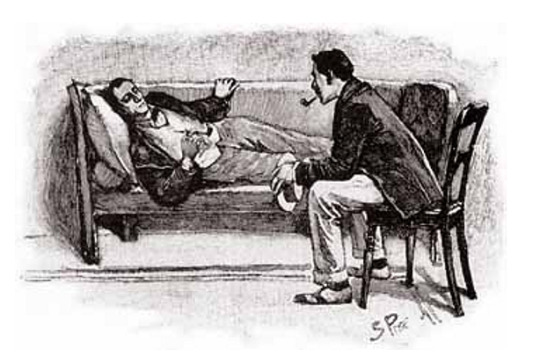
This is evidence that Victor Trevor did in fact have a dog, even if its name is not mentioned, and Holmes got bitten by it, which effectively tied him to Trevor. This seems to fit extremely well with @sagestreet’s analogy. So if in our show Sherlock’s father was ”allergic” to dogs (meaning that Sherlock wasn’t allowed to express homosexuality), then Redbeard might actually still have existed belonging to Victor, right? And Victor may have named his dog after the pirate character he used to play with Sherlock. Maybe Sherlock loved Redbeard as if he were his own, and his friend too, but Redbeard might have been put down for some reason, symbolising the repression of Sherlock’s love for his friend? In GLOR, though, Victor Trevor doesn’t die; he moves to Terai, India, to a tea plantation… ;-)
Apart from playing pirates as a boy, in TFP we also see Sherlock hijack a fishing boat and actually become a pirate. I don’t think piracy is ever mentioned as such in canon, but the closest ACD comes to this is probably the story about Victor Trevor’s father – also referred to as ”the Governor”(!). In his youth, Mr Trevor (whose real name was actually James Armitage) got involved in criminality and ended up hijacking a ship – The Gloria Scott – where he participated in a mutiny which eventually blew up the ship in the middle of the ocean. Armitage was among the survivors, but so was Hudson, a man who later caused his death from fear when he threatened to expose his great secret. Considering that homosexuality was regarded a crime in Doyles’ time, I think this points to Victor’s father being a gay man pressured with exposure.
The need for a new start
As for the ending of TFP, I’m still totally baffled by it, after all these years. I think it has been likely to produce cognitive dissonance (X) in the audience, which is probably one of the reasons that so many fans felt uncomfortable after S4. To me, it’s hugely contradictory in a logical sense, and I’ve always had problems trying to wrap my head around the very different messages that I think it sends out.
On one hand, as @thewatsonbeekeepers so brilliantly explains in their meta, Sherlock has finally managed to connect his heart with his brain, going through all the mental trials from his metaphorical sister in TFP. He has also re-built his home and he and John are symbolically running out of ‘Rathbone Place’ (and by association all the old adaptations) in the final scene. Which points to there being room for new, modern things to happen in their story, no longer just ’business as usual’.
On the other hand we have comphet!Mary’s final voiceover about the legend and the non-importance of who Sherlock and John really are, which didn’t at all ring true to me in a logical sense. Why would Sherlock go to all this trouble of finding his true self, connecting heart with brain etc, if it didn't even matter? And why would a ghost, who didn’t even experience TFP while alive, be allowed to take over the role as storyteller and have the final word? I think this speaks for some huge un-solved problems and ‘lose ends’ that are not at all tied together properly - neither on the text-, subtext- or meta-levels.
And - what’s even more important in my opinion - Sherlock and John seem to be frozen in time in the final scene.

We’re told by comphet!Mary that “...there are two men sitting arguing in a scruffy flat... like they’ve always been there... and they always will.” In TFP, the address 221B Baker Street is described as a kind of eternal institution which people - even Mycroft - turn to as a last resort, when everything else fails. The flat is rebuilt and some piece of furniture is changed, but nothing is modernized. Even the smiley face on the wall, on which Sherlock shot holes in his fit of frustration in TGG, is painted again and done the exact same thing to. But as everyone loves the place, no one protests. Status quo is reestablished.
This may be the conclusion of many adaptations, but it’s not what happened in canon, is it? This is not even remotely similar to the original ending. In ACD canon, it’s not “always 1895″, as so many readers through the ages have nostalgically claimed. Canon’s LAST ends in 1914 - almost 20 years later - with Holmes and Watson driving away together in a car, with Watson at the wheel. Byt that time, Holmes is no longer living at Baker Street - he has retired. In fact, there’s a whole story (LION) where Holmes is now living in Sussex close to the sea, in spite of his earlier statements about how much he dislikes the countryside. So in canon, he spends his time there (when he’s not on super-important spying missions for the government). And in LAST there are even some indications that Watson and Holmes are heading for a hotel room in London - not 221B. I have tried to expand on these conclusions in a recent comment on @sagestreet‘s last meta (X), providing some circumstantial evidence that might be interesting. ;-)
I’m not sure about @thewatsonbeekeepers’ claim that their meta has “just been an academic exercise”. While we don’t have any solid evidence of a pending S5 at this point, logical reasoning - and ACD Canon - still tells me that TFP must not necessarily be the end of the show. If Sherlock is in a coma, any future new content needs for him to wake up, he needs to open his eyes in the show’s reality, for TFP to ever make sense on a plot level. For what’s the point of having a story go in circles? (I tried to analyse the significance of time in BBC Sherlock here (X) some time ago).
Sherlock Holmes and codes
I really like @thewatsonbeekeepers’ musings about Greg Lestrade’s name and the implication of Sherlock suddenly having it right in TFP:
This is tied into Sherlock’s inability to move beyond the mistakes of canon – we see this weird inability to stick in modern Sherlock’s universe in other ways too, like the slightly old-fashioned nature of his costume (passed off as ‘timeless’, but clearly belonging to old as much as modern times), the deerstalker situation, thinking England has a king, not knowing the earth goes around the sun, not knowing Madonna, seeming to forget who Thatcher is – the list goes on, but Greg is the most constant one. Calling him Greg is a symbol that Sherlock has broken out of the confines of all of the past Sherlocks and has completely slipped into the modern version – which is exactly where he needs to be.
I totally agree that this is where he needs to be, and I also agree about Sherlock’s clothing here. I seem to recall ACD’s Watson talks about “a certain quiet primness of dress” in Holmes, which most probably meant a suit, something that our modern Sherlock seems to still use as signature clothing as well, which might appear a bit unnecessarily formal today. But let’s not forget that in the Gay Unaired Pilot, Sherlock was wearing black jeans and a rather more casual shirt with rolled-up sleeves:

Overall, I got a more “modern” feeling from Sherlock’s looks and behavior in the Pilot than in the rest of the show. I think code is significant in BBC Sherlock, and this goes for ACD Canon as well. And I believe that “pilot” might be one of the more important code words, as I tried to explain in this meta about codes a couple of years ago (X).
In TFP, the “Golf” in “Golf-Whisky-X-ray” (the message that Sherrinford picks up from Sherlock’s and John’s highjacked boat) literally means “I require a pilot” in marine signals - a marine pilot, that is. Which metaphorically might suggest that Sherlock needs someone to help him navigate their ‘ship’ through the dangerous waters (= emotions).
There’s also the sleeping pilot in TFP, who little Eurus - probably representing a part of Sherlock - can’t seem to wake up. She requires a pilot to land safely, but for some reason she calls him “the driver” instead of “the pilot”.
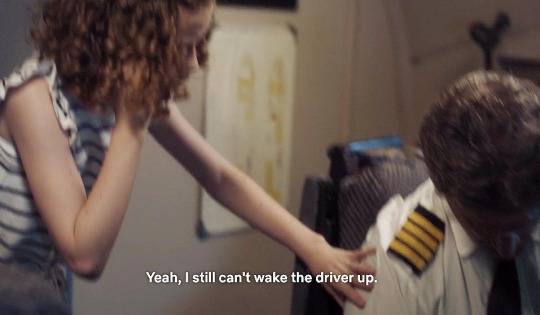
A pilot’s uniform with four stripes on it means the rank of Captain, right? (X) And who do we know who is a military Captain? Why, Captain John Watson, of course, from Fifth Northumberland Fusillers! :-)
In the unaired Pilot Jeff Hope - one of several John mirrors in this show - drives Sherlock home in his cab, instead of to Roland Kerr’s Further Education College as in ASiP. This journey ends at 221B where Hope tries to kill Sherlock with poison, which is stopped by John who shoots Hope (and we don’t see Sherlock stomping on his wound in the Pilot, probably making his aneurysm burst; in Pilot it’s just John). So that would basically be ‘John killing John’, which @thewatsonbeekeepers presents as a risk in TFP - the risk that makes Sherlock realize that he needs to open his eyes and save John Watson from killing himself.
I agree, but I also want to focus a bit on John killing himself being a clear risk already from day one in BBC Sherlock. In their second meta of the series (X), @thewatsonbeekeepers also mentions this:
‘Did you miss me?’ works for both of those layers – the danger John is in from criminals is something that was really apparent in s1 and 2, but John’s endangerment from suicide is also something that was there at the beginning of the series. Sherlock changed these things – and didn’t realise he was the changing factor, but something in his subconscious is telling him that with him gone, John Watson is once again in danger.
Most of us probably thought that John had found a far better use for the gun in his drawer in the first episode of the show when he killed a villain instead of himself with it. But looking at it metaphorically, this course of events maybe wasn’t that good either. In canon’s first story STUD, Jefferson Hope dies from an aneurysm - close to the heart; not to the brain as in ASiP, and not from a gunshot at all. Both metaphorically and literally, Hope died from a broken heart. Rather than a villain, he was an avenger who killed two criminals who had caused the death of his loved one and her father and got away with it.
As far as I can recall, in ACD’s stories neither Watson nor Holmes ever shoots anyone, with one exception: they shoot Tonga, the little guy threatening them with poisoned arrows in SIGN. Who I feel pretty sure is meant to represent Cupido, the little guy with the love arrows, of whom ACD wrote this poem (X). They shoot Tonga, the Agra treasure is lost and as a result of that, Watson marries Mary Morstan instead of staying with Holmes. And then she becomes Mary Watson (representing the heteronormative concept of ’marry Watson’). Love (between Holmes and Watson, I presume) is presented as a bad, toxic guy in canon.
And in BBC Sherlock Jeff Hope is presented as a bad, toxic guy. The little guy with the arrows being a villain is also mentioned in TSoT, which is drawing from SIGN. In a flashback related by Sherlock at John’s wedding, we see a very small guy chasing John and Sherlock over a rooftop, trying to hit them with darts from his blowpipe. This case is never explained in the show, but from John’s online blog (case called “The Poison Giant”) we learn about a very short jewel thief called James Swandale, who had killed people with poisoned darts. He and his giant friend also tried to kill John and Sherlock (note the symbolism here), but they never got to know why. Metaphorical meanings throughout canon, picked up by BBC Sherlock.
Already in ASiP Sherlock claims he can identify “an airline pilot by his left thumb”. In the unaired Pilot, however, the pilot’s thumb for some odd reason was instead “a retired plumber’s left hand” (the rest of the quote is identical between the Pilot and ASiP). And, as @kateis-cakeis pointed out long ago, the whole filming of the Pilot is mirrored in ASiP; every single scene these two similar episodes have in common is reversed and reflected like a mirror. As far as I can see ASiP references the Pilot.
And then we have the female pilot in TAB, who comes to ask Sherlock if he had a “pleasant flight” after his OD trip on the plane.

Four stripes = Captain, right? John. Turns out she very much resembles Lady Carmichael from his MP adventure. (And still I think we have good reason to believe that both characters were only occurring in Sherlock’s EMP).
All in all, I think this points to the concept of “pilot” being an important element to set things right in this show, and that of course has to do with John; he’s the ‘driver’. Some of us have even been discussing that this show seems to go in circles with lots of recurring themes. Canon doesn’t end with 221B; it starts with it. So the full circle is closed with TFP, unlike canon. But returning to the Pilot and things as they were between Sherlock and John at the end of that episode, could also mean the beginning of a new course of their relationship. A version that was never allowed to be shown before because of homophobia, but that new course would ultimately be more consistent with canon, rather than with people’s nostalgic perception of canon for 100+ years.
@thewatsonbeekeepers mentioned in their other meta about TFP (X) that the Governor of Sherrinford is a John mirror, who lost his authority when Eurus - the ‘gay trauma’ part of Sherlock - managed to manipulate him. The Governor ends up shooting himself - ‘John killing John’ (again). And indeed John’s character seems a bit weak as a doctor in S4. For example is his competence questioned by both Culverton and Sherlock in TLD (but Sherlock still wanted to be examined by John earlier in TLD :) ). This is consistent with canon’s DYIN, where Holmes horribly manipulated Watson to believe he had a disease that was “contagious by touch” and even insulted his competence (“you are only a general practitioner with very limited experience and mediocre qualifications”), in order to set a trap for Culverton Smith.
So my conclusion is that Sherlock’s manipulations of John - especially faking his own death after TRF - might have played a part in John’s lost authority and even in him being suicidal. But my point with all this rambling is that maybe John is meant to regain the lead now, to “buck up a bit” as Mrs Hudson puts it in TLD, before he’s finally allowed to be behind the wheel of her fast sports car. Maybe things will sort themselves out once Sherlock starts to break out from the circle and finally be honest with John, even let John take the lead, without fear of losing him to the villains, and once John starts to regain confidence in himself and who he really is. If they (and we) don’t need any ‘further education’ at Roland Kerr’s, John can simply drive Sherlock home now, wherever that is. :-)
@raggedyblue @sarahthecoat @gosherlocked @sagestreet @ebaeschnbliah
28 notes
·
View notes
Text
~Sherlock's Paradox~
...The Story of The Hungry Donkey
"I wrote my own version of the Nativity when I was a child. The Hungry Donkey. It was a bit gory. But if you’re gonna put a baby in a manger, you’re asking for trouble."
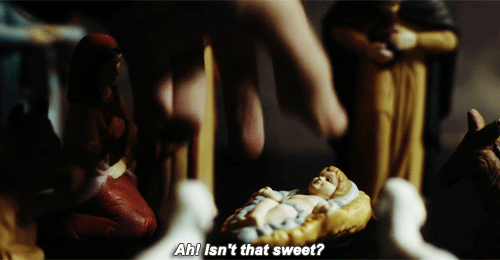
A hungry donkey enters a barn in search of hay. Much to his delight he discovers two identical haystacks, each on the opposite side of the barn. The donkey stands in the middle of the barn between the two piles of hay, not knowing which one to choose.
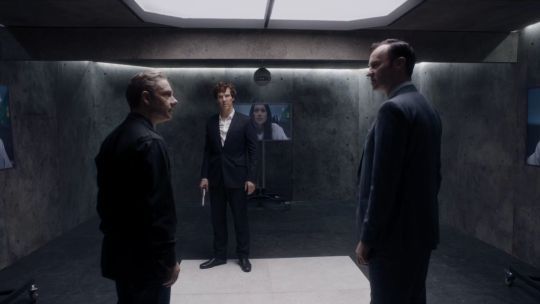
This short parable comes from the French logician and philosopher Jean Buridan’s commentaries on Aristotle’s Theory of Action. The moral of the story is: Not deciding has consequences.
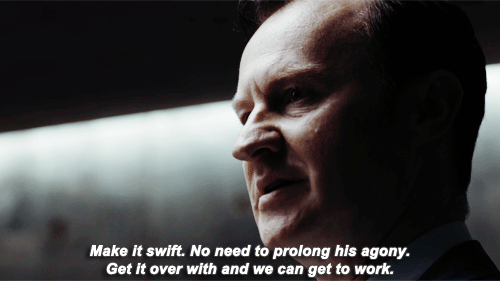
Buridan's ass is an illustration of a paradox in philosophy in the conception of free will. It refers to a hypothetical situation wherein a donkey that is equally hungry and thirsty is placed precisely midway between a stack of hay and a pail of water. Since the paradox assumes the ass will always go to whichever is closer, it dies of both hunger and thirst since it cannot make any rational decision between the hay and water.
Should two courses be judged equal, then the will cannot break the deadlock, all it can do is to suspend judgement until the circumstances change, and the right course of action is clear. — J. Buridan
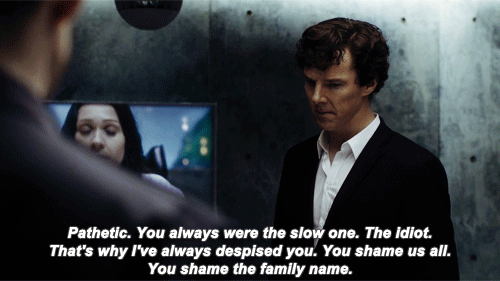
Later writers satirised this view in terms of an ass which, confronted by both food and water, must necessarily die of both hunger and thirst while pondering a decision.
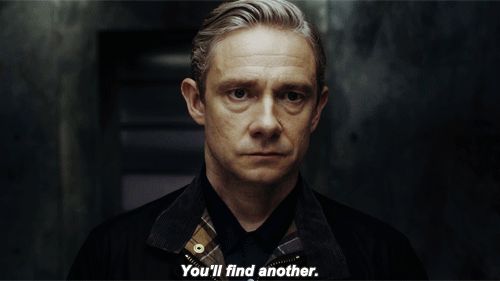
...in his Ethics, Benedict de Spinoza suggests that a person who sees two options as truly equally compelling cannot be fully rational:
"It may be objected, if man does not act from free will, what will happen if the incentives to action are equally balanced, as in the case of Buridan's ass? (In reply,) I am quite ready to admit, that a man placed in the equilibrium described (namely, as perceiving nothing but hunger and thirst, a certain food and a certain drink, each equally distant from him) would die of hunger and thirst."

"A certain food and a certain drink." Sherlock's Food of Knowledge, his brother Mycroft, or his Cup of Tea, John? In this case, Sherlock did not have free will at first. He only had two choices. We all know, now, that Mycroft was trying to get Sherlock to do the opposite; to shoot him, but in a choice between his own brother, or John, Sherlock knew either way he would forever be starved. Killing himself was the ultimate choice in free will in this case. It freed all of them, and assuming EMP, this is Sherlock teaching himself that he is not controlled by his perceived cold side, and refused to see others lives as a game. Sherlock can let go.
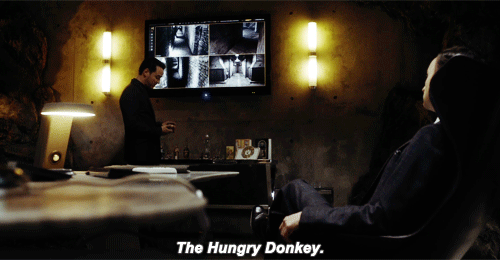
Some popular culture References of note:
"Buridan's Ass" is the name of the sixth episode of the first season of the FX television series Fargo.
In the Doctor Who novel The Eight Doctors, the Fifth and Eighth Doctors are confronted by a Raston Warrior Robot. The Doctors stand exactly the same distance away from the Robot as it approaches them; unable to decide which to attack first (since the Robot attacks by sensing brain patterns, which are identical in the two Doctors), the Robot shuts down.
The lyrics of a song by Devo, the title track from their album Freedom of Choice, describe a similar situation: "In ancient Rome, there was a poem / About a dog who found two bones" who then, unable to choose between the two, "went in circles till he dropped dead."
In the 10th season of The Big Bang Theory, Sheldon and Amy discuss the history of Buridan's ass (renamed donkey), and its application to their lives. Amy resolves the paradox (of Sheldon desiring to live in different apartments) by creating a more desirable option by engaging Sheldon in a discussion of the theory and its history. Source
@may-shepard @isitandwonder @love-in-mind-palace @darlingtonsubstitution @gosherlocked @loveismyrevolution @let-bijohns-be-bi-johns @sarahthecoat Inspired by comments from @monikakrasnorada redbeard
#The Hungry Donkey#A Parable on choice#Sherlock's Paradox meta#Food or Drink#Moriarty's Game#Buridan's Ass#Aristotle#TFP
237 notes
·
View notes
Text
Romeo at Juliet’s Tomb Was…Happy?
Or, Act 5 Romeo and the ramifications of his badass heartbreaking tragic psychic break.
So this Act 5 Romeo meta got me thinking not only about how differently Romeo acts when he hears Juliet is dead…but also how differently he acts when he is faced with her seemingly dead body in the tomb.
Most stage and film Romeos act appropriately bereft, grieving, and emotionally devastated, but is this interpretation warranted? Close reading his final monologue, one may even conclude that Romeo faced with Juliet’s dead corpse was…happy?
Light
So there is definite positive imagery in the beginning of his first address. The very first thing Romeo says after killing Paris, when he turns to Juliet, is this:
How oft when men are at the point of death
Have they been merry! Which their keepers call
A light'ning before death. O how may I
Call this a light'ning? (5.3.88-91).
Romeo here mentions the paradoxical phenomenon of death row prisoners being happy just before they die (a “light’ning before death”—hysteria?). This implies that Romeo sort of sees being with Juliet as a “light’ning” too (also a callback to Juliet’s nervous “too much like lightning”?), a paradoxical lifting of the spirits. At least, before the reality of Juliet’s death returns and he realizes that the situation is not something he should feel light about at all.
It’s an unorthodox thought for someone who has just lost the love/passion of his life, but it makes sense regarding 1) Romeo’s psychic break and 2) Romeo’s previous description of Juliet’s tomb as “a lantern” and “a feasting presence full of light.” The use of “light’ning” continues this light imagery. Romeo is clearly in denial as to the full reality of Juliet’s death.
Beauty
The next few lines Romeo utters are dedicated to Juliet’s beauty, as lovely and sweet and ravishing as his previous love language:
Death, that hath sucked the honey of thy breath
Hath had no power yet upon thy beauty.
Thou art not conquered. Beauty's ensign yet
Is crimson in thy lips, and in thy cheeks,
And death's pale flag is not advancéd there. (6.3.92-96).
Aside from an acknowledgment of Juliet being dead, this is Romeo at the balcony all over again, upholding Juliet’s sovereignty, her sun-like beauty. Except this time it’s laced with a war metaphor. Perhaps this is why Romeo suddenly pivots his attention to Tybalt, asking him for forgiveness—recoiling from the still-fresh memory of the living Juliet? There is that paradox again, that push-and-pull of Romeo’s awareness that Juliet is gone and his denial (“thou art not conquered”) that he is with her and that she is still with him.
Death
Despite the fact that Romeo is clearly not in his right mind, he is sane enough to notice and remark upon Juliet’s unusually preserved body. However, this is true to character: Romeo is not an observant character in general, but when it comes to Juliet, he’s Sherlock Holmes.
Ah, Juliet,
Why are thou yet so fair? Shall I believe
That unsubstantial Death is amorous,
That the lean, abhorréd monster keeps
Thee here in dark to be thy paramour?
For fear of that I still will stay with thee
And never from this palace of dim night
Depart again. (5.3.101-108).
The fanciful connection of Juliet with Death is personified and eroticized (this is clearly where French RetJ got its thirsty La Mort, ha). Romeo continues his paradoxical attitude towards Juliet’s death and his own impeding one—both by acknowledging that it is a death and denying that it is “true” death. Juliet’s tomb is a lantern, a feasting presence, and now “a palace of dim night”—this is Romeo’s home now. He doesn’t so much dances away from the reality of death as adorns it—makes it pretty and attractive. Here lies Juliet—thus, is it really even death?
Eyes, look thy last.
Arms, take thy last embrace! And lips, o you
The doors of breath, seal with a righteous kiss
A dateless bargain to engrossing Death. (5.3.112-115).
Death and he are making a deal, or a “bargain.” There is something almost defiant in “righteous kiss,” as if in killing himself, Romeo is defying death itself in being with Juliet. Again, this harkens back to Death being Juliet’s jailer, keeping her prisoner.
Final Words
When Romeo at last comes around to the necessity of killing himself, his language becomes even more antagonistic towards death, and even the poison he uses to kill himself:
Shake the yoke of inauspicious stars
From this world-wearied flesh [...]
Come, bitter conduct, come, unsavory guide,
Thou desperate pilot, now at once run on
The dashing rocks thy seasick weary bark. (5.3.115-118).
Romeo does not desire death for itself, but as a means to an end—being with Juliet. Regardless, here is where he truly acknowledges to himself the reality of what he is about to do, almost as if the very words are his pep talk to himself into drinking the poison.
In Sum
Romeo’s fulsome monologue is a definite contrast to Juliet’s quick, stoic decision to kill herself, complete with two kisses. But that is because 1) Romeo does have the time and no one is around to stop him, whereas Juliet is about to be discovered, 2) he is not so much grieving as luxuriating in Juliet’s presence—soaking her up as it were before he really can’t enjoy her. And most importantly, 3) for Romeo, killing himself is not really dying. Logically, yes. But emotionally, no, he doesn’t feel it.
Most adaptations of course go for the bereft Romeo, which is what we would expect. But I had to direct this monologue either on stage or in film, I would direct the actor to play on this push-pull within Romeo. I see him as in awe, lovey-dovey, basking in Juliet’s presence, perhaps even playful—but then slowly the reality gets to him and his behavior begins to be more erratic. Romeos that are sobbing messes don’t really go with the feel of the monologue, which is 80% love language, albeit laced with death imagery. In a sense, this whole monologue is Romeo’s “light’ning” before death. Thus, play it light.
#romeo and juliet#rj meta#r&j meta#cristina metas#i think leonard whiting in zeffirelli film did that monologue best#he had such awe#like yeah he’s about to die and all but also juliet 😌
9 notes
·
View notes
Text
Way Too Deep (TAB rewatch)
Going back to The Abominable Bride? What is this madness?
Do not fear, I won't even dwell on the hidden meanings of the whole parallel reality set in 1895. Instead, this will be the beginning of my modest attempt (read: slightly disfunctional coping method) at making some sort of sense out of S4. I could read all the meta, and agree with it even, but at the end of the day I just have to take the raw data and digest it on my own.
Why start from TAB? If I recall correctly, it wasn't originally conceived as a bridge between the two seasons – and yet, it has such a peculiar structure that I can't justify it being just a coincidence. If you will, I'll look at the frame rather than the picture.
TL; DR: what if Sherlock overdosed on the tarmac plane... and never came back?
So, let's begin well into the third act (1 hour or so into the episode):
MORIARTY: Because it’s not the fall that kills you, Sherlock. Of all people, you should know that. It’s not the fall. It’s never the fall...It’s the landing.
Sherlock wakes up on the plane and the narrative trick gets exposed: the Victorian adventures were a creation of Sherlock's drug-fueled mind.
Sherlock's usage is not exactly news to us - hello, heartbroken Shezza in a crack den - but this time it feels different. It's not just escapism or the siren's call of addiction; he doesn't look high, not even to John Watson MD, which by the way has already seen him under the effect. This is the very intentional treading the fine line between sanity and delirium, between life and death:

JOHN: For God’s sake! This could kill you! You could die!
SHERLOCK: Controlled usage is not usually fatal, and abstinence is not immortality.
...all for the sake of "solving a case" or, should we put it in plain words, going deep and deeper into his own mind.
Strap yourselves in, 'cause we're going for a ride. From this moment on, we'll bounce back and forth between reality and hallucination, the two separated by a boundary so unstable that we won't even see it.
Notice how heavily drugged-Sherlock sounds fairly coherent so far – and yet, when Mycroft speaks:

MYCROFT: A week in a prison cell. I should have realised [...] that in your case, solitary confinement is locking you up with your worst enemy.
...his mind palace fabrication unexpectedly bleeds into reality:
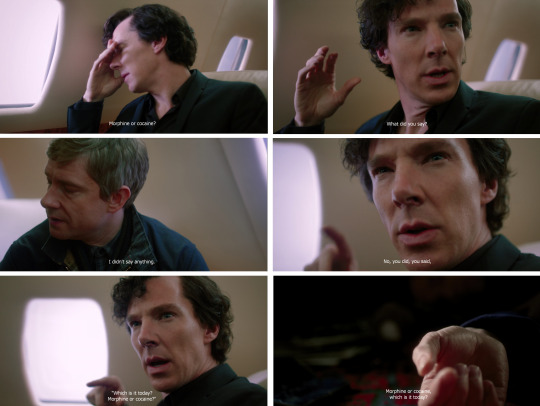
JOHN (offscreen): Morphine or cocaine?
SHERLOCK: What did you say?
JOHN: I didn’t say anything.
SHERLOCK: No, you did. You said ...
(As he says the next sentence, it’s Sherlock’s lips moving but we hear John’s voice.)
SHERLOCK/JOHN: Which is it today – morphine or cocaine?
What did spur this abrupt transition? What is Sherlock's worst enemy? Himself, his addiction or... Moriarty, though a figment of his imagination, trapped in his mind palace?
Victorian Sherlock goes on with his investigation, which ends with the crypt scene. Sudden plot twist: under the bride's veil there's not Mrs. Carmichael, but... Moriarty again.

MORIARTY: Is this silly enough for you yet? Gothic enough? Mad enough, even for you? It doesn’t make sense, Sherlock, because it’s not real. None of it. [...] This is all in your mind. [...] You’re dreaming.
Cue another transition to a hospital room, which looks just a bit surreal. What's up with the red blanket and the carpeted floor? Why is Sherlock just lying there in his suit?

Doesn't look very much like an overdose intervention... because it isn't. This is not reality.
In fact, Sherlock goes on all jolly to unbury Emelia's corpse (let me be pedant: just like a recent overdose patient should do), and we're given a couple lines that reinforce how much of a pressing matter all this is to him:
SHERLOCK: It’s why we came here! I need to know.
JOHN (turning away): Spoken like an addict.
SHERLOCK (straightening up to look at him): This is important to me!
Sherlock and Lestrade dig, Mycroft supervises (lazy sod, eheh), until the casket is unearthed – pay attention to what Mycroft says here:
MYCROFT: We do have slightly more pressing matters to hand, little brother. Moriarty, back from the dead?
And yes, immediately after Moriarty is mentioned, another turn into surreality takes place; the skeleton moves on its own, a spectral voice calls, and Sherlock is back to his mind palace.

VOICE (rhythmically, as if reciting lyrics to a song): Do not forget me.
... and Holmes starts violently and wakes up to find himself lying on his side on a narrow rocky ledge. Water is pouring over him as if it is raining heavily.
HOLMES : Oh, I see. Still not awake, am I?
"Still not awake" - what a peculiar choice of words. The line between reality and hallucination is feeble because it's not there; the plane, the hospital, the cemetery? All fabrications of his own mind.
Look, even Moriarty must be tired of beating around the bush, 'cause he doesn't talk in riddles anymore. He just lays it out:
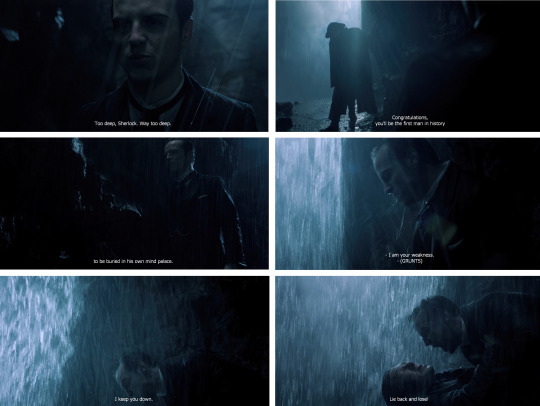
MORIARTY: Too deep, Sherlock. Way too deep. Congratulations. You’ll be the first man in history to be buried in his own Mind Palace.
MORIARTY: I am your WEAKNESS!
MORIARTY: I keep you DOWN!
MORIARTY: Every time you STUMBLE, every time you FAIL, when you’re WEAK...
MORIARTY: I... AM... THERE!
MORIARTY: No. Don’t try to fight it. LIE BACK AND LOSE!
So, not only Sherlock has gone deep into his mind palace, he never got out of it and he literally can't.
John coming to the rescue must represent Sherlock finally waking up... or does it?

WATSON: So, how do you plan to wake up?
HOLMES: Between you and me, John, I always survive a fall.
In fact, Sherlock jumps and falls deeper down and while we're told he always survives the fall, we're never told about the landing. We're circling back to what Moriarty said.
At this point, is Sherlock waking up on the plane again even real? Do overdosed people just wake up like that, and go on with their day like nothing's happened?
Furthermore, if Sherlock really woke up on the plane, this should be where the episode ends.
Why, instead, go back again to 1895?
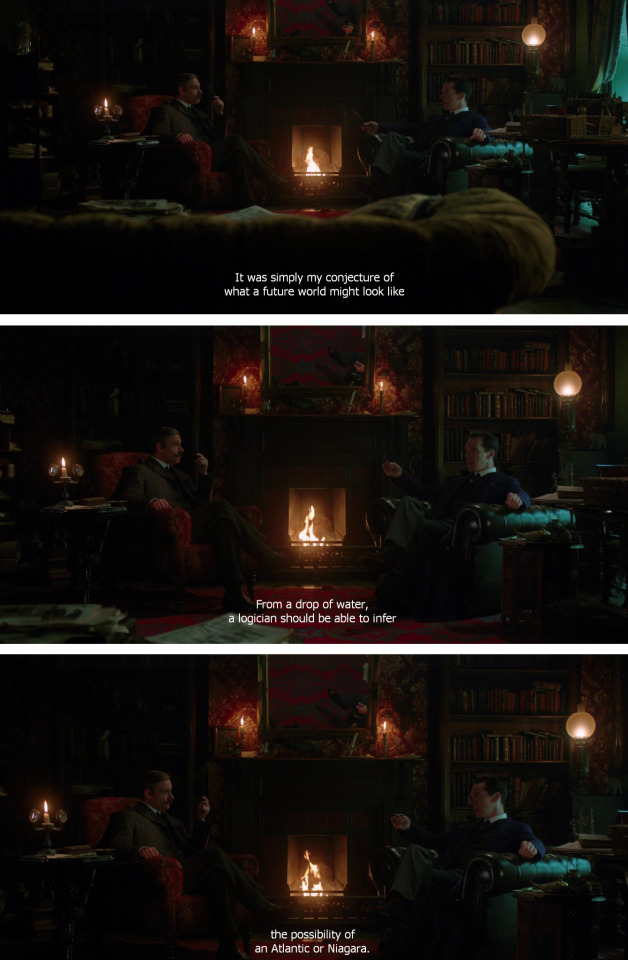
HOLMES: It was simply my conjecture of what a future world might look like, and how you and I might fit inside it.
HOLMES: From a drop of water, a logician should be able to infer the possibility of an Atlantic or a Niagara.
Where is this happening? What's the "Atlantic" (or Niagara, or Reichenbach) we should be able to infer?
The structure of TAB – the back and forth between past and present, fiction and reality - reminded me of this zen koan:
"Once upon a time, I, Zhuangzi, dreamt I was a butterfly, fluttering hither and thither, to all intents and purposes a butterfly. I was conscious only of my happiness as a butterfly, unaware that I was Zhuangzi. Soon I awakened, and there I was, veritably myself again. Now I do not know whether I was then a man dreaming I was a butterfly, or whether I am now a butterfly, dreaming I am a man. Between a man and a butterfly there is necessarily a distinction. The transition is called the transformation of material things."
As you may know, a koan is a paradox: for instance, you can't be both man and butterfly, but at the same time you can't be definitively sure about one or the other. This is where we're left at the end of the episode – hanging on the doubt that what we've seen so far has been imagination disguised as reality: Sherlock can't be both in present time (having woken up on the plane) and in the Victorian setting we've just seen.
So we should infer that he is still stuck in his mind palace, and his hallucination is not only about the 1895 timeline, but comprises all the scenes set in present time, too -"It was simply my conjecture of what a future world might look like"; also, he might have overindulged with his drugs, to the point of never coming back to consciousness.

WATSON: As for your own tale, are you sure it’s still just a seven percent solution that you take? I think you may have increased the dosage.
Notice how the overdosing incident will never be mentioned again, which makes sense if we assume that it's a point stuck in time with no foreseeable resolution – an idea which is supported by Mycroft's notebook, in the form of the Minkowski Metric we can see there:
a formula referring to special relativity, more specifically "the spacetime interval between any two events is independent of the inertial frame of reference in which they are recorded" (x)
All this, in the perspective of interpreting S4, makes for an interesting premise... but we'll look into it another time.
_____
Dialogue transcript source: Ariane DeVere
239 notes
·
View notes
Text
Escalation of Commitment in Fandom
You know that feeling when you’re standing at a bus stop at the end of day, and the bus doesn’t come and yet you keep waiting, even though it’s already been fifteen minutes and you’d aready be almos home if you’d walked instead? That feeling that the bus has to arrive any minute now, even though you know that at rush hour all bets are off? That feeling that keeps you rooted to the spot, because you don’t want to admit that you made the wrong decision? That feeling that makes you invest even more time even though you’re already invested too much time in waiting as it is?
That feeling right there is what behavioural economics call Escalation of Commitment. It’s a useful concept to explain why people make irrational investment decisions, be it that they’re investing time, money, or any other resource known to mankind, to justify a previously made investment that hasn’t payed off.
In fandom we invest time, love,and thought, to name just three. We spend a lot of time watching and re-watching our favourite shows, we write long analyses about them, and, above all, we are deeply invested in them on an emotional level. And the more committed we are, the more it hurts to leave that fandom behind, even if we haven’t been happy with the direction canon has taken for quite some time.
(Of course, the paradox of being a fan is that you’re more likely to spot the flaws of the thing you love, but that discovering them also hurts you more than a casual consumer.)
Perhaps the strongest form of fannish commitment are endgame and tinhat theories. The level of wank in the Sherlock fandom surrounding TJLC certainly testifies to this, as does the fame of spn_gossip well outside of SPN fan circles. What distinguishes these types of fannish commitment is the ensuing level of escalation, i.e. the abjuration of all reason in favour of more and more convoluted conspiracy theories.
For instance, a lot of people watching the early seasons of SPN probably thought that Jared and Jensen looked hot together and had great chemistry. Quite a few fans could probably get behind the idea that the two of them were dating. But then they got married. And while a lot of fans then abandoned their previous tinhatting and stuck to writing fic about them, a small group interpreted these weddings as proof that they were secretly together. Because, you know, if they weren’t together, they’d have no need to be married to prove their heterosexuality. Jensen and Jared then added a couple of kids into the mix, probably causing yet more fans to jump the ship (pun intented!), while the remaining tinhatters only became more convinced that they were secretly involved.
What we can witness here is the evolution of a particular fannish reading practice that takes every new canon detail as a confirmation of the existing hypothesis even (and especially) if it openly contradicts it. What follows is a more and more vicious and violent attempt to bend reality to fit said hypothesis, including death threats sent to actors or producers and the bullying of other fans who dare to disagree. Anything rather than having to admit that the inital hypothesis might have been wrong.
In the case of endgame theories this type of escalation usually comes along with accusations of queerbaiting. Unfortunately, this drowns out the critcism of actual queerbaiting in favour of calling out what is essentially fans queerbaiting themselves. (Which is what fans truly want, so the remarkble conclusion of Britta Lundin’s remarkably awful novel Ship It.)
If one of the actors or writers comments on the strength of Dean and Cas’s frienship, this is proof that Destiel will become canon.
If one of the actors or writers states that there’s nothing going on between Dean and Cas, this is also proof that Destiel will become canon. Because it’s obviously a lie, meant to protect the secret.
If Dean and Cas share a scene, it’s proof of Destiel.
If Dean and Cas share less than ten minutes of screen time over the course of a whole season, it’s likewise proof of Destiel, because clearly the entire significance of the season rests in said absence.*
And, true to the nature of escalation of commitment, this type of reading the show only intensifies year after year. When I first entered fandom during season 9, people were already saying that Destiel would be canon any day now, writing long, long metas to prove their point. When S10 aired, people once again stated that there was no way Destiel wouldn’t become canon by the end of the season, only more intensely, insisting that the clues this season were even more significant than they’d been the previous one. Which is what led us to endgame Destiel meta for S14 stating that S9 was nothing compared to what’s going on now. The overall message being: That we were wrong in the past only enforces our present argument.
We might find that ludicrous, or we might not; we might believe or we might not. It’s all fine.
Except that what’s not fine is that a lot of very young and easily impressionable fans are being set up for a huge disappointment.
If I spend forever waiting for a delayed bus, to come back to the introductory example, that’s my problem. However, if a manager of a multi-national enterprise decides to invest more resources into a project that’s proven to be a mistake, chances are that he’s not the one who’s ultimately going to pay the price for that. Just think of the financial crisis of 2007/2008 - the product of massive failures in executive and supervisory boards, yet the cost is being shouldered by the (future) taxpayer.
So I really wish that there was a bit more awareness in fandom of how endgame narrative theories can impact other fans. I’m not sure how often I’ve seen asks in the SPN tags where some poor fan pinned their entire hopes and happiness on their OTP becoming canon. Way too often. And while no fan’s meta is the root of another fan’s neurosis, we (as in: fandom as a whole) might consider a little more closely just how much we’re enabling other people’s escalation through our own.
*Needless to say, but I’m pointing it out all the same because this is Tumblr, the same logical fallacies colour the anti-shipping discourse within fandom. Shipping isn’t irrational per se, no matter what canon vs. fanon wankers would like us to believe. It’s a perfectly valid reading of canon - and canon as such isn’t accessible to us without some kind of interpretation.
#supernatural#on fandom and fanart#queerbaiting#canon vs fanon#my meta#metaish thoughts#potentially unpopular opinion#frozen rambles
47 notes
·
View notes
Note
That's a remarkably level-headed review of the CCU. When I heard about the endings, I thought that it ranked up there with HIMYM in terms of disappointment.
Thankfully I never touched HIMYM with a ten-foot pole but I was on tumblr when it happened and I saw it was rough...
A few days ago when I started seeing rumors (at first they were/I thought they were rumors, based on, like, leaked stuff or something), I just knew they were true because I was reminded of the Sherlock finale when people were like... this leaked stuff must be fake because it’s too bad to be real. I learnt from the Sherlock fandom that if the leaked stuff seems too bad to be real, it’s real.
Spoilers below.
I mean, the movie itself has its good things. But... it’s the bare minimum, you know? The final battle was good but, like, it wasn’t hard to make a cool final battle with the material they had... (like, they just couldn’t fail on the epic battle sequence, it was what these movies are made for) in fact when the final battle started, I felt like it is about fucking time. Like two hours and a half of movie were just the preparation for this sequence, and it came a bit too late, you know? Especially since technically a lot of stuff that happened during the time travel, didn’t, in fact... exist by the end of the movie. Or whatever.
In fact I hate time travel storylines. They must be done very, very well to work (think The Prisoner of Azkaban, the book) and this movie bent over itself trying to make it work but a) the whole meta “let’s make fun of the concept” fell flat because you did do the thing you’re saying you’re not doing, dumbass; b) eventually it made no sense anyway.
I personally hate time travel storylines especially when the characters open timelines that end up not existing eventually, or when the time travel changes things in ways that don’t actually make sense unless a lot of paradox stuff that it doesn’t get really dealt with but just... trust us~. This movie did both things - I believe? Steve “annulled” the new timelines in his last trip so they happened but didn’t happen at the same time, but then Steve did change the past, and... it should not make sense given the premises of the rules of time travel established by the movie itself? Because Steve created some weird kind of time loop, in his new timeline he just... existed for decades when he actually didn’t. And in the main timeline everyone else has a different past then him...
(How did Steve’s life work, anyway? He turned on the tv “this important political figure was assassinated, now there’s even more political instability!” “oh, Bucky’s out having fun”. Peggy kept running Shield? And Steve knew there was Hydra inside it? So he just ~lived his life~ ignoring what was going on, or he fought anyway and the only difference was that he was married to Peggy?)
(Also he must’ve reunited with her in 1970 and wasn’t she already married by then according to The Winter Soldier? Because Bruce couldn’t have sent him in a different moment in time, since Steve, well, didn’t ask him to.)
And of course processing loss in a healthy way and moving on and opening yourself to love other people is only for random civilians, not for heroes. Steve encourages Joe Russo to date a new guy but he, worthy of wielding the damn hammer of Thor, cannot do the same thing he tells others to do? That’s such a slap in the face, to the fans and to the character.
Being unable to process emotions healthily while being a hypocrite is apparently the new heroic thing to do. Good to know.
But it’s spn time now :)
6 notes
·
View notes
Text
Determinism vs Free Will and Sherlock’s two falls.
When he jumped from the rooftop, Sherlock was carrying out an action that looked like his own free will but which he actually had no choice in. Determinism in philosophy says that humans cannot act or behave in any other way than they do. Everything that is going to happen is already determined by past events. We have no true freedom, only the illusion of it.
Sherlock couldn’t not fall from Bart’s, because Moriarty ensured through his own suicide that Sherlock would have no choice but to kill himself too. In Causal Determinism, cause-and-effect means that any event is completely determined by prior states. Sherlock knew that Moriarty killing himself gave him no other option, that by that one action (the cause) he must now die (effect).
Continue under the cut ...
From John’s view Sherlock chose to jump. But the audience knows that he was ‘pushed’. So there are two perspectives - from John’s, Sherlock seemed free to do as he wished, but from the other view we could see every action that lead inevitably to the result.

His fate was inescapable, and you could trace that fate back to the beginning of Moriarty’s “game”. One long chain of cause-and-effect that lead ultimately to Sherlock’s death, no matter what he tried to do to stop it. Sounds like Death in Samarra, doesn’t it?
The opposing philosophical idea to Determinism is Free Will, which says that we do have control over our actions, that they are not already determined, that we are capable of choosing between different outcomes. That we are truly free.
Perhaps this is the point of Sherlock’s second fall, the one from the waterfall in TAB, where he is very clearly making his own decision to jump. It is certainly suggested in his expression as he falls that this is Sherlock re-writing his own story the way he wants. Not the way it was forced to be. He still takes the leap, but this time it was of his own free will.


If Determinism were true, it would be like being trapped, being forced to play out a part that is already written. However, free will suggests that we truly have some control over the way our lives turn out. This subtext in Sherlock is very much about being trapped into doing what is expected of you versus being free to do what you wish.
The story of Death in Samarra from TST could be another intentional reference to Determinism. It tells a story about the course of the universe being fixed, and that we therefore cannot outrun our fate. What happens, must happen.
Guess what else in TST is about Determinism???! Sherlock’s speech about predicting the future. Because if Determinism is true then the future is theoretically calculable. What Sherlock says in TST is all over the Wiki page on Determinism:
The theory holds that the universe is utterly rational because complete knowledge of any given situation assures that unerring knowledge of its future is also possible. - x (wiki page)
If it were actually possible to have complete knowledge of physical matter and all of the laws governing that matter at any one time, then it would be theoretically possible to compute the time and place of every event that will ever occur. - x (wiki page)
If you could attenuate to every strand of quivering data, the future would be entirely calculable, as inevitable as mathematics. - Sherlock in TST
Sherlock in TST (despite his Free Will fall in TAB), seems dedicated to a Deterministic - completely rational - view of the world. This is another example of Sherlock fully embodying his facade in S4.
“I’m Sherlock Holmes, I wear the damn hat”
Facade!Sherlock (Hat Man) would be quite happy to exist in a universe where everything were predictable and calculable. It would give him a feeling of control, and it would give him what he craves - the potential to know everything. The potential to deduce anything, including the future. To know everything would be to have nothing to fear.
The determinism vs free will debate is very often focussed on how each effects moral responsibility. If Determinism were true - and Hard Determinism precludes any free will in any of our actions - it would relieve Sherlock of responsibility for his behaviour. And it would relieve him of the guilt of knowing that he had had the freedom to make other choices. It isn’t his fault that John suffered because of his faked death, or because of his failure to confess his love, because he had no free choice in any of his actions.
“Jean-Paul Sartre suggested that people sometimes avoid incrimination and responsibility by hiding behind determinism: "...we are always ready to take refuge in a belief in determinism if this freedom weighs upon us or if we need an excuse"” x
Even after Mary made what she thought were random (free) choices in TST, she was unable to get ahead of Sherlock, because in S4, Hard Determinism is real and “no human action is ever truly random”.
Every one of her movements had been determined already, because humans cannot act or behave in any other way than they do. This is how (symbolically) Sherlock found her.


“On one hand, if determinism is true, all our actions are predicted and we are assumed not to be free; on the other hand, if determinism is false, our actions are presumed to be random and as such we do not seem free because we had no part in controlling what happened.” x
Moftiss’s writing on Doctor Who deals with this stuff a lot because stories with time travel in them constantly need to decide whether our actions can alter the future, or whether history is fixed. Moffat’s solution in DW is a combination - there are “fixed points” - certain moments in the universe’s history which must always happen as they do, but then there is flexibility too...

But getting in to the way Moffat handles this in DW is a whole other meta.
[I genuinely came across this entire idea from reading an example of determinism versus free will which used a freaking DIVING BOARD as an example of the distinction between the two concepts. The example said that Determinism is like someone being pushed from the diving board, and Free Will is like someone making their own decision to jump off it (Sherlock’s fancy gay little diving move before he jumps in TAB???!). It made me wonder whether the diving board analogy is like a common philosophy textbook example or something, and if Moftiss have referenced it?? I was unable to re-find where I read this diving board analogy (damn it!).]
Now flash forward from TAB to TFP, where the theme of the episode is I Want To Break Free.
In TFP we get an odd mixture of determinism AND free will represented in the scenes where Eurus forces Sherlock and John and Mycroft to make choices.
Being forced and being allowed to choose should be opposite ideas according to our Determinism vs Free Will subtext. So what’s happening in TFP in Eurus’s game is that we are tricked into believing our characters are being given choices, when they are really trapped in a psychopath’s game! These are NOT choices they are being given. They are prisoners - they have no free will.
I think this is telling a story once again, about the illusion of free will, JUST like Sherlock’s fall from Bart’s did. (SO did the Cabbie’s pill game in ASiP, btw! The cabbie gave his victims a choice, but it wasn’t a very good choice. Choose the gun, or a 50/50 chance at death. The cabbie’s victims were doomed to die though. The existence of any choice in the matter was an illusion.)
The determinism vs free will subtext is not so much simply Moftiss’s opinion on an ongoing philosophical debate, but rather they are using it as a commentary on the way we are made to believe that we are free, when we are not.
“None are more hopelessly enslaved than those who falsely believe they are free” - Johann Wolfgang von Goethe
John is “not free” either (but at least he knows it now). These texts are always about Sherlock, remember. It was just texting, but I wanted more!

I’ve only seen this text message interpreted in terms of John being “not free” because in his heart he is with Sherlock (and as a reference to TPLoSH’s “I am not a free man”).
But reading it in terms of Free Will frames this text message as being more about our freedom to choose our future, and that John here knows that he can’t outrun his own Death in Samarra which is his heteronormative/no-homo ending that he gets in S4. “Things won’t end well”. Nope. No they did not. “It was nice to get to know you a little”. Because friends are as close as John and Sherlock are going to get (for the time being).
Back to TFP, in the room with only the gun, Sherlock is forced to choose between John and Mycroft, but chooses not to choose, which @tendergingergirl explained here is an example of Buridan’s paradox, another little piece of philosophy referenced here.
On a surface level, clearly Sherlock could simply not bring himself to murder his brother, and so turned the gun on himself.
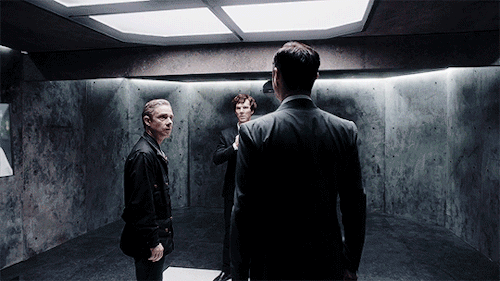
But the subtext of it - in terms of determinism vs free will - is that killing himself was the only free choice left available to Sherlock. It was what Eurus didn’t want him to do, and she was probably hoping it wouldn’t occur to him. Because it was the one choice left open to Sherlock which would represent a genuine act of Free Will, as it was neither of the two “choices” that were given to him. Neither of those were truly choices. But killing himself was.
(And with the Cabbie in ASiP, Sherlock did the very same thing. He chose the gun instead of one of the two bottles of pills. But the gun was a fake, in a similar way to how a tranquilizer gun is fake. In ASiP Sherlock ended the Cabbie’s game by essentially getting up and walking away. In TFP he’s managed to escape Eurus’s game the same way - by finding a loophole. He didn’t kill Mycroft, he was able to make a different choice. Of course it didn’t seem like a good choice, but it was a loophole and it allowed him to symbolically escape, proving that perhaps he is indeed Freer than he thought.)
So while Sherlock shows this obsession with Determinism in TST, it seems he is rediscovering his desire for freedom in TFP.
Instead of playing Eurus’s game, Sherlock flipped the chess board. He knew, or had just figured out, that Eurus didn’t want him to die yet, and so Sherlock realised that he held the power over her. There’s a bit of a hint in one of Moffat’s Doctor Who episodes....
“The first rule of being interrogated is that you are the only irreplaceable person in the torture chamber. The room is yours, so work it. If they're going to threaten you with death, show them who's boss. Die faster.” - Heaven Sent (2015), written by Steven Moffat.
So the direction here is good - we’re moving from Sherlock in TRF doing as he is forced, to in TAB and TFP doing what he chooses. From things carrying on as they always have been (determinism), to rewriting history (free will)...
“You wrote your own version, as I remember. Appointment in Sumatra. The merchant goes to a different city and is perfectly fine.” - TST
@justanotherone16 tagging you because philosophy!
More meta: A Leap of Faith by @raggedyblue and our musings on Reduction ad absurdum here and here and also Mind the Gap again by @raggedyblue. I’m betting there’s more metas out there about this stuff but these are the ones I found. Thanks for reading! :-D
[This is a bit like my Murder, not Suicide meta, but that was in the context of the suicides of gay men that were “murders” perpetrated by homophobic society]
74 notes
·
View notes
Text
Superwholock Theories
Supernatural- 3 Theories
JOHN WINCHESTER WAS POSSESSED BY MICHAEL
1. This fan theory posits that because John said “yes” to the Archangel Michael when he was younger, Michael continued possessing him later in life. Fans believe that this would explain the disparity between John’s treatment of Sam and Dean, as opposed to the vastly different relationship he shared with his other son, Adam. Perhaps John was actually preparing the boys for their futures as vessels for Michael and Lucifer.
Although this probably isn’t the case, that doesn’t mean this theory is without merit. The series has already previously established that an angel could possess a human without their knowledge, so it’s not out of the question. If John were a puppet for Michael, it would certainly lead to an identity crisis for the Winchester brothers. How could they trust anything or anyone after a revelation like that?
THE VIEWER IS GOD
2. Despite fans’ love for the prophet who turned out to be God, not everyone is sold on Chuck Shurley as the one true Almighty. One anonymous fan actually suggests that God is not any character that we have or will ever meet on Supernatural for one simple reason: God is the viewer.
At some point, archangels wrested the power from God, leaving him or her helpless to stop them. However, God remains omniscient, and so continues to see and hear every aspect of the story, although there is no way to impact anything that happens. This fan also points out that this would mean that the closest the Winchester brothers ever came to truly tracking down God was in season 6 episode “The French Mistake”, in which Sam and Dean travel to a fourth wall-breaking alternate universe.
GABRIEL IS ALIVE
3. This theory is one that has not only been fueled by fans, but by Richard Speight Jr. as well. Lucifer killed Gabriel in Season 5… or did he? Gabriel was not only ridiculously powerful, but also incredibly clever. He did appear in season 9 episode, “Meta Fiction”, although he was then revealed to be nothing but a ruse performed by Metatron.
According to Speight Jr., “One theory is that obviously Metatron is controlling the whole thing and that I’m really just a projection…but that makes you wonder why he doesn’t just appear.” The jury may be out on whether or not Gabriel will return, but the actor who played him is reasonably sure that the archangel is alive and well. Perhaps there is hope for Sabriel fans after all.
Doctor Who- 3 theories
WEEPING ANGELS ARE DEAD TIME LORD
1. No monster in New Who has gained quite as much popularity as the Weeping Angels – after initially being introduced in the Tennant-era episode Blink, the villains have been referenced multiple times by both the Doctor and other characters throughout the show.
One such reference, in The End of Time Part Two, has Time Lords covering their faces ‘like the Weeping Angels of Old’. This has led to fan speculation that Weeping Angels might be the ghosts of fallen Time Lords, whose constant exposure to the Time Vortex has left them capable of displacing people through time and feeding on the resultant lost potential.
Considering that Weeping Angels are incorporeal until the moment they’re seen, and that they’re considered one of the oldest races in the universe, this theory does hold up to a certain extent. It certainly would explain why Weeping Angels patrol graveyards and crypts so commonly in the show.
SEASON SEVEN PART ONE HAPPENS IN REVERSE
2. No fan of modern Doctor Who will forget the heartbreaking end to Amy and Rory’s time as companions to the Doctor – sentenced to death by a Weeping Angel, the pair are given the opportunity to grow old together in New York, but are unable to ever see the Doctor again. Some question why the Doctor couldn’t simply pick them up in another part of their timeline – and others wonder if that’s exactly what he does.
In A Town Called Mercy, two episodes before Rory and Amy’s departure, an offhand reference is made to Rory leaving his phone charger in King Henry the VIII’s bedroom. In the next episode, audiences see this very scene play out, suggesting that the episodes A Town Called Mercy and The Power of Three are out of order.
Some fans have taken this to suggest that the Doctor’s appearances throughout the Ponds’ final adventures are in reverse order – having lost Amy and Rory to the Weeping Angels, the Doctor is travelling backwards through their timestream to visit them at different times. This culminates with the Doctor saving their marriage from divorce before finally saying goodbye to them and moving on to live in Victorian London.
THE DALEKS ARE INCAPABLE OF KILLING THE DOCTOR
3. In any given episode of Doctor Who, it’s taken for granted that the Doctor will spout a lot of expositional dialogue, and that the villain of the week will allow him to do so unchallenged. Such is frequently the case with the Daleks, the Doctor’s greatest enemies, who, while regularly in a position to end the Doctor’s life, instead choose to let him ramble for a while before he makes his escape.
While many might see this as simply a convention of the show’s formula, others have begun speculating that there might be a reason for the Daleks’ inaction and repeated failure to kill the Doctor. Way back during the Tom Baker era of Doctor Who, the Fourth Doctor found himself in a position to destroy the Daleks – one which he rejected, ultimately leading to their initial creation in the first place. Some fans believe that because of this paradox, the Daleks are actually unable to kill the Doctor – they can’t do so for risk of eliminating themselves from the timeline as a result.
This theory gained more traction as a result of the most recent Season Nine of the modern Doctor Who, in which the Doctor saved the life of the child who would grow up to be Davros, creator of the Daleks. Thus the Daleks are forever desperate to kill the Doctor, but ultimately unable to do so without risking the life of their creator.
Sherlock- 3 Theories
The whole series is just Mycroft keeping Sherlock sane, and John is an actor
1.This theory is quite a convoluted one, so strap yourselves in. What if all this time, everything was just a fake-out that Sherlock's enormously powerful big brother is making up? All these crimes and villains are just there so he has something to do, and to keep him off the drugs.Whenever Sherlock's bored, he turns to drugs. But Mycroft is fully aware of this, so he sets up elaborate crimes for Sherlock to solve. And maybe to help him, he hired an actor named John Watson.
Yes, we know what you're thinking. Utter baloney. But when Sherlock first meets John, he lists of a load of facts about him, and John is astounded. But we see no actual evidence to support Sherlock's claims, aside from a brief flashback of John's time in the army. And even that is a dream sequence in which you don't actually see John himself. Is he just preparing for his next role?
We never actually meet John's supposed lesbian sister that he mentions at their first meeting, and when John does doctor-y things, he doesn't look very convincing (like checking Sherlock's pulse in his wrist rather than his neck, and falling asleep while working at a clinic).
When John first meets Mycroft at an abandoned warehouse, he offers Sherlock's new friend money to spy on him, which John turns down. Why wouldn't John recognise his new employer? Mycroft could have done it anonymously. And maybe he just wants to see how John can handle such a threatening situation.
All this would explain all the odd moments that Sherlock manages to triumph in, in particular that odd scene where he manages to easily rescue Irene Adler from a group of terrorists. But what about Moriarty? Simple, he actually was an actor called Richard Brook after all.How did Moriarty get all the money to carry out his dastardly schemes? Mycroft, of course. Sherlock's big bro needed to come up with a supervillain with seriously dangerous crimes to go along with him. This also explains how Moriarty knows so much about Sherlock.
In 'The Reichenbach Fall', Moriarty suddenly claims to be an actor named Richard, and was hired to make detective seem like he was solving crimes. While we all assume this to be a horrible and clever lie, what if it was the truth? He actually wanted to get rid of this weird acting gig. And the next time he's on screen, he's gone mad, is forced to carry on the charade, and shoots himself.
Sherlock and John are secretly dating and will CANNON!
2. there's some real logic behind it (sort of).
Followers of the 'JohnLock' conspiracy reckon that creators Steven Moffat and Mark Gatiss will eventually turn Sherlock and John's bromance into a full blown romance by the end of the series.
And it's not silly 50 Shades-style fan fiction, but there's been a massively in-depth analysis of scenes and scripts that apparently alludes to a secret relationship.
According to the theory, some fans reckon that the duo's story features plenty of narrative and filming techniques that frame them as a proper couple, not just good friends.
One example is a reference to the ending of Casablanca in 'His Last Vow', and how there are secret hearts littered in their scenes:
Plus, John doesn't correct Irene Adler when she mentions how the two of them are attracted to Sherlock, even though they're usually interested in the opposite sex.
Sherlock used to be an MI6 agent
3.We know little about Sherlock and Mycroft's spiky relationship, but there's one theory that could help explain it a little better. Sherlock once worked for him as a secret agent.
It's easy to guess that Mycroft is the head of the British secret service, so perhaps he once hired his baby brother as one of his top agents.
There have been clues pointing towards a third Holmes brother, so maybe he was also an agent but had a rather nasty death on the job.
This terrible event could have sent Sherlock a bit doolally, forcing him to quit the gig and eventually become a private detective, causing a bit of a rift between the two remaining siblings.
This would explain just how Sherlock also has quite the skills when it comes to kicking ass and infiltrating a terrorist gang and all that.
#superwholock#doctor who#supernatural#sherlock#john barrowman#matt smith#david tennant#benidict cumberbatch#martin freeman
7 notes
·
View notes
Note
Ditto on the anti-cis/straight logic (not that they are oppressed or anything of course, just echoing your logic) There's a very popular fandom on here that people often complain about due to the supposed fetishization of gay pairings. However, the only relationship that is actually even hinted at in canon lore is a straight relationship, and the writer received death threats for it. It's unrelated, but I just feel like there's so many clashing feelings that it leads to unhealthy expectations
"The only relationship hinted at canon lore" if you're talking about sherlolly (or even adlock or johnlock or any ship) I would have to disagree about this being a "canon lore". I'll be very honest here, I'm not trying to insult any pairing but: I don't think moftiss has any intention to make a pairing any more or less canon than the others.Because the fact is: every shippy thing we see in canon is always either 1) ambiguous or 2) one ship being canon implies other ships are NOT canon....And yet, the show always give hints for ALL ships to be canon simultaneously - which obviously cannot be the case.Which leads me to think that: moftiss is doing this (hints at all ships as canon despite the clashing paradox it presents) because they WANT it to be open ended.To me, the show presents itself so ambiguously that honestly it's difficult to say which one is the "right way of reading canon". If sherlolly is canon because of the "I love you scene", does that logic factor in the fact that Sherlock said it under duress? Is he upset because it's what he feels for her? Or is it because he knows he had hurt her badly by telling her a lie she wanted to hear? Is it because he loves her as a romantic interest, or is it because she's a dear friend to him?Or is adlock canon because Sherlock still sends to be enthralled by her and even John asks him to go out with her? But if adlock is canon, that means sherlolly CAN'T be. And does Sherlock love Irene romantically? Or is he intrigued and fascinated by her as a compelling foe -- the woman who beat him? But if it's just a foe, then why does she keep popping up in his head even when he doesn't want to think about her?Or is it johnlock that's canon? I'm not gonna go into any meta here coz I prefer to use the evidence before your own eyes (the show in the way it presents itself) rather than extrapolating speculation from an assumed subtext. But the fact is, Sherlock has done a great deal for John -- above and beyond anything anyone can ever do for someone else. Is this just normal acquaintance type of friendship, or something much deeper? And why does everyone including Mrs Hudson, Irene, Moriarty and even Mycroft allude to the idea of John and Sherlock being so close that they're basically a couple? But if John is the person who Sherlock loves romantically, then why is Irene the person who pops up in his head, and what does Sherlock mean when he calls Molly "the one person that mattered the most"?And then there's Moriarty, all that blatant flirting, I mean that one is so self explanatory in all the flirting they do, and yet such a weird juxtaposition to the destructive nature of their relationship towards each other. Even getting a gratuitous kiss scene of its own too. So yeah, I could go on but I think you're getting my point. I agree with you about the anti-cis anti-straight comment and fandom toxicity. But with regards to the comment of "canon", I honestly think moftiss are DELIBERATELY making every ship half-float half-sunkAs far as I'm concerned, the only canon pairing that matters to me is Sherlock and angst 😂
22 notes
·
View notes
Text
The Final Problem Giga Meta 3/4: Eurus and Jim’s tests
Part 2
It is time for Moriarty to make his triumphant return.
I want to break free
I want to break free
I want to break free from your lies
You’re so self satisfied I don’t need you
I’ve got to break free
God knows, God knows I want to break free
I’ve fallen in-
And Moriarty stops right before Freddie can say ‘love’.
So yes, it’s all about love. Sherlock is in love, and needs to break free, to confess. But for now, he’s still repressed and the word won’t be heard.
And Moriarty, despite the governor’s wishes, enters Sherrinford, right after making a blatant sex reference. He’s entering Sherlock’s ‘body’ after making a sex joke, like a virus getting his way in a body, or a sexual predator.
This Moriarty is different from the one we’ve known for ten years. Moriarty has always been dangerous, but there was always a sense of, I dunno, fun? He plays gay, he dances while making the coup of the century, he whines to Sherlock ‘Go on, for me. Pleeeease?’
This Moriarty is intense. From the moment he takes his earbuds, he is predatory. He’s always the boss and even his ‘jokes’ feels like a powerplay. And you get the feeling that Mycroft is barely handling him.

Even his clothing is different. He’s only wearing black, something he’s never done before and this will only accentuate the contrast with Eurus, who is only wearing white.

Jim and Eurus are in EMP two sides of the same coin, but one is seen as ‘black’ and the other as ‘white’. One is evil/scary while the other is errr… slightly better. But these two are in sync as they move their heads.
These two are fascinated. White invited black and made the first move, like some fucked up version of chess, but they remain on different sides, always protected from one another by a shockproof glass.
And they’re about to prepare their plan. Moriarty is an enabler, and he’ll give Eurus the means for her to escape and be in control.
SHERLOCK: Eurus is in control.
LITTLE EURUS: Help me. Please, I’m on a plane and everyone’s asleep. Help me!
JIM: Hello. My name’s Jim Moriarty. Welcome... to the Final Problem.
SHERLOCK: It’s okay. He’s dead.
JOHN: He doesn’t sound dead.
MORIARYT: This is a recorded announcement. Please say hello to some very old friends of mine.
LITTLE EURUS: Hello? I can hear you talking. Please help me! I’m on a plane and it’s going to crash!
We’ve finally reached the beginning of the episode. Now that Eurus is in control and the team is stuck in her cell, Little Eurus has a chance to be heard and Sherlock understands immediately that this is a very important matter.
But Eurus isn’t quite ready to let them have free access to Little Eurus yet, so they are going to earn their phone time by completing several tests.
Each one has several purposes:
one is to make John and Mycroft compete,
another is to advance Little Eurus’s journey,
the last one is Moriarty’s poisoned gift: will Sherlock manage to keep his moral code? That one is going to be represented by a train journey (Did you know his brother was a station master? I think he was always jealous).
Make no mistake, these games were always about John and Mycroft, and it looks like Sherlock has accidentally got them switched in this episode. And for very good reasons:
EURUS: I’m particularly focussed on internal conflicts, where strategising around a largely intuitive moral code appears to create a counter-intuitive result.
The Final Problems is nothing but internal conflicts and the efforts to maintain a mostly subjective moral code under duress. But, Eurus is about to prove something she’s intuitively deduced: strategising around a largely intuitive moral code create counter-intuitive results and we get this paradox. Under these experiments and the stress:
John (The Heart) -> The Brain, and
Mycroft (The Brain) -> The Heart.
And each one of her games will prove it plenty enough.
Game 1: Who is going to kill the governor? John or Mycroft?
Would you rather live with the guilt of killing the governor or live with the guilt of not having prevented his wife’s murder? They’re fucked whatever choice they make. Nobody wants to kill the governor but they all more or less agree he needs to die. The question is never whether they should kill him but who would. Who will Sherlock choose to do it? Who will have the honour of killing the governor? Mycroft or John?
Surprisingly, Sherlock starts with Mycroft. The man who seemingly has no experience with killing is the one who is given the honour.

The Iceman, the man whose name should at least imply a certain Machiavellian approach of this is the most emotional of them all. If Mycroft is the one perceived to be the “Brain”, he still retains a strong moral compass and uses it under duress: he will not kill. He’s close to hyperventilating, this goes against his perceived principles but he doesn’t break. He’s drawn the line and not even Sherlock can change it.

John then takes the gun and tries to rationalize it. This is the so called “Heart”, trying desperately to justify what he’s about to do. He’s a soldier, to hell what happens to him, the man in front of him has accepted his death. By killing the man, he’s saving the wife. That’s what he wants, they’re saving this man’s wife and his sacrifice is something to be proud of. This is very planned, a use of hard facts and a refusal to listen to his heart to keep going: the man with the strong moral principles is willing to throw them away and live with the guilt he’s killed an innocent man. All because he knows that’s what the governor wants: saving his wife.
In a surprising plot twist, Mycroft can’t do it because his moral compass is against murder and John, our Heart, is cold logic and about to kill his own mirror, and probably have a normal heart rate, as if he was calm.
EURUS: This is very good, Doctor Watson. I should have fitted you with a cardiograph.
But even then, John can’t. John Watson is only human and he’s the Heart. He is a good man, the good doctor and no matter how much he tried to twist it, he knows he can’t do this. He has his priorities, like he says after the fact, and his priorities involve not dirtying his hands even if that ultimately got a woman killed.
Heart and Brain are in agreement: they can’t kill. The governor has to kill himself and that changes nothing. Game over.
And that’s how starts Jim’s test: How will Sherlock act in front of an impossible choice? Are you really not going to dirty your hands? Because there will be consequences. And because they didn’t quite suceed in this test, the train is waiting for them this is the beginning of their moral lapse.
JIM: Come on now! Aaaall aboard! Choo-choo! Choo-choo!
Game n°2: Make use of your friends, Sherlock, I want to see you interact with them. Which one is better?
It is never said that this is paint on the wall. This is meant to make us think that this is blood. The walls are bleeding. And the governor’s blood is the last thing we see before we enter the new room. There is a connection they want us to make between the governor and the state of Sherrinford.
In other words, if Sherrinford is how Sherlock represents his own body, it means that he is bleeding internally.
John has failed his last test and is going to make sure nobody else suffers from his hesitation. Mycroft knows that they should not be playing and decides to stay out of it.
JIM: Fasten your seatbelts. It’s going to be a bumpy night!
This is actually a reference to the movie ‘All about Eve’. But because the film was made in 1950, he isn’t referring about cars but about planes. So, we’re granted phone time with Little Eurus. Sherlock is still dying and they must solve this because there’s a girl on a plane with nowhere to land.
So starts the series of deductions that is supposed to kill the Garridebs killed the victim.

For the second time, John is the one with the Machiavellian approach while Mycroft is being boringly ordinary. Mycroft snaps, he calls the game for what it is: a competition between the two of them. Which one does Sherlock like better? Who does he need to solve the case?
John lays down some hard facts: none of this matter, we play the game and to hell with what happens to us.
Ultimately, this is a team effort. John’s experience with weapons leads Sherlock to find out which Garrideb couldn’t do it. Under John’s words, Mycroft decides to bring his help to know who did. The case wouldn’t have been solved this quickly without these two. Their method is however very telling.
John does his part with what they’ve originally been given. John helps with pure facts.
Mycroft? He deduces Alex Garrideb only once he’s in front of them. Mycroft helps Sherlock with context. And with Eurus, that means emotional context.

Remember Sherlock and Mycroft playing deduction in TEH? Mycroft’s deductions were all correct but based on probability. He failed to account sentiment. He couldn’t see how a piece of clothes could ultimately reveal how its owner felt but not this time.
This time, he’s giving the first lines to link the man’s mental state with his new-found vision. He’s the one proving he’s not wearing glasses anymore even though all physical signs should point he still does. The laser-surgery has done the trick, of course that’s why he’s wearing these clothes, he’s making an effort. Sherlock finishes the deduction, “Suddenly he sees himself in a different light.” This time, Mycroft managed to take sentiment into account and that’s how Sherlock gets the final piece of the puzzle.
In front of the two Holmes’ mental prowess, John can’t stop a little compliment, in admiration of the deduction thing. Mycroft on the other hand feels disgusted by what they’re doing. They can’t do this, playing god and deciding who lives and who dies.
For the second time, John and Mycroft’s functions got switched.
In the end, this doesn’t matter.
Jim’s test n°2: Does it make a difference if the innocents die instead of the guilty? Do you really believe there is some justice? Who would you condemn?
This is disgusting in how true what Eurus said is. A life is a life. We can protest in the number but they were given a choice and they tried vainly to protect the other twos. And yet, they’re the ones who ultimately decided to condemn Alex.
Their moral value has taken the biggest hit yet. They’ve decided a hierarchy and in trying to uphold it didn’t even manage to save one man.
JIM: Mind the gap.
‘Mind the gap’ thanks for entering the train, I mean you condemned a guilty man to death right then. Oh you’re not happy? You really wanted the guilty one to die? Okay.
JIM: The train has left the station!
Enjoy your stay, no turning back, it’s too late.
Bonus: EMP evidence
There was one feature of interest that wasn’t pointed out during the deductions:
EURUS: Two of the Garridebs work here as orderlies, so getting the third along really wasn’t too difficult.
If you know Sherlock lore, you’ll know that there was only one real Garrideb, the other two having never existed. Nathan was the only genuine Garrideb.
We’ve got two Garridebs out of three who weren’t real in the book, we’ve got two Garridebs out of three working in Sherrinford. If we want to make an educated guess, one would assume that the two working for Sherrinford must have had a common point in the original story.
So, ultimately, we can build a strong case that it is Howard and Alex who are working for Sherrinford.
And it is actually quite fitting, isn’t it? That the two Garridebs who were never real are working for a prison that’s never existed.
Game 3: Which side are you on? How are you going to bury what “I love you” really means? Will it just be part of a game? A case? A heartfelt confession?
The only active parts John and Mycroft have in this round is regarding mini Eurus. That’s the first time they seem in-character: John wants to believe they can save her, Mycroft is aware they cannot risk the lives of the people in the city Eurus can finally guess.
But it’s still fitting their new function because (spoiler), this city is London. And the people who’d die if the plane crashes are everyone Sherlock loves. So basically, Mycroft is still thinking with his heart while John is about survival instinct. The planes needs to crash into the sea (and water means death) otherwise London is doomed and everyone living in it will die.
MORIARTY: Your friends will die if you don’t.
Because if the plane reaches his destination and doesn’t crash into the sea (Sherlock dies) the people he loves who lives in London are going to die.
This time, Sherlock is playing solo.

John and Mycroft are merely behind him, on his shoulders, just observing. This shot strongly reminds of the imagery of the angel and the devil on your shoulders. Sherlock without looking at them needs to pick a side. But who is the angel and who is the devil?
Frankly, it doesn’t look good for Sherlock. Because he never answers his phone and Molly is upset, our John mirror is literally crying over tea. Right now, Sherloci is paying for his mistakes. John used to text him all the time and he’s constantly deleted his texts beginning with ‘Hi’, he’s refused to answer his phone.
First attempt fails. Eurus, who has taken control of Sherlock’s phone (his heart in other words) tries again. And now that John begs her to pick up, she’s willing to see who’s the bastard phoning her.
We begin with a condition Eurus sets: no matter what, Molly can’t know why she needs to confess. Sherlock begging, explaining how much he cares for her and how her life is in danger won’t cut. Speaking from the heart won’t work. Not on its own.

That’s why the game starts with Sherlock acting, trying to seem composed and we only sees Mycroft, the Brain, in these moments. This tactic fails.

Now, he’s is outright lying. This time, nobody is behind him.
This backfires terribly. That’s exactly because of these lines that he’s hurt her.

When he’s panicking, we see Mycroft and John: this is the real Sherlock, the one who is desperately trying to save her life and isn’t able to act as if it’s not important.
Does he love her? Yes, but not like that. She’s his friend, she matters a lot to him. He loves her enough to save her life, he’s willing to say these words and pretend they mean more if that saves her. It’s as much manipulation as truth. After all, if these words were meaningless, why was it so hard for him to say these words? He even says it twice, while both men stand behind him, a proof that this isn’t only an act.
In the end he does it. They both confess but he’s lost something important in the end.

Where is John? The two angels on his shoulders, one just vanishes the second Molly confesses. He thinks he’s won but Sherlock in his confession has unknowingly pushed John aside.
While more metaphorical, saying these words and forcing Molly into confessing has killed any meaning it had. This is what “I love you” stands for they’ve buried. Again, they were going to lose no matter what. Love has become nothing but another tool to use in the game and by letting this play this way, Sherlock has also lost John.
MYCROFT: Sherlock, however hard that was-
Once again, the reactions of Mycroft and John are telling. Mycroft acknowledges Sherlock’s pain. He was the one who was completely horrified when Sherlock was forced into confessing. He knows Sherlock has lied to save her, he gets how hurt he is right now and he tries to be comforting even if Sherlock cuts him off. John?
JOHN: I know this is difficult but you’ve got to keep it together.
Stiff upper lip. To hell with sentiments, we must keep going, we have a game to win. Soldiers until the very end, even if Sherlock has just had a breakdown in front of him.
This is his version of kindness but it’s also very telling. He asks Sherlock to keep a clear head as if sentiments will hinder them. Emotion is viewed as the crack in the lens, the virus in the data.
Let’s stop fooling ourselves: this John is a soldier, one who has thrown his heart away and is only working with his brain. Don’t expect him to be anything but coldly logical. He has become the Brain.
Jim’s Test n°3: Will you really turn love into a game as well, even if you hurt others?
And Moriarty is extremely happy with how things are turning.
I love how you destroyed this woman’s heart. Look at all these complicated emotions. I thought she was your friends, you monster. Well I say that, I’m quite satisfied. You’re doing well.
JIM: Ticket please!
Time to face the station master. Everything is going smoothly.
Game n°4: Who would you rather kill? John or Mycroft?
Ah the impossible choice. Which one does Sherlock like better? Mycroft or John?
It doesn’t even take a second before said choice is made: Mycroft orders Sherlock to kill John and gives his reasoning. Sherlock is going to need brainpower, John amounts to nothing, they are soldiers, sentiments have no place here and John needs to die for his country.
And he decides to voice out everything people think John is here for. What people who don’t get Sherlock think. And it’s brutal, it’s cruel, it makes Sherlock look selfish and arrogant and John insignifiant.
John agrees. It doesn’t take anything but that, he agrees with the reasoning. The betrayal he’s felt moments before is gone, he is accepting this fate, like a good little soldier. How could he not in front of such clear logic? He knows he matters little and isn’t going to put a protest.
Intellectually, it makes perfect sense and John agrees to die. The Brain is okay with dying if that means a greater chance of survival.
SHERLOCK: On balance, even your Lady Bracknell was more convincing.
Sherlock is finall telling the truth to Mycroft. Holmes and Watson, kept prisonner in Victorian times finally managed to give their opinion on this. He’s never loved his Lady Bracknell and by extension, he hates her victorian values. He doesn’t want, like John, a repeat of 1895, he wants to be free and live his life as a modern man.
But despite the truth of what he’s said, Mycroft has never intended to survive this game. He knows that Sherlock and he will have more chances to survive than Sherlock and John and yet he refuses to let Sherlock kills John Watson. That would destroy him after all. He ever intends to make this an easy choice. Let him becomes the villain, that way Sherlock will be able to survive the crippling guilt of fratricide.
MYCROFT: I suppose there is a heart somewhere inside me. (...) Why don’t we try for that.
Sentiment. Mycroft is willing to give his heart for Sherlock. His brain belongs to England but his heart? Sherlock can do whatever he wants with it.
There. There is no word for this. This is the most selfless act I’ve seen. John has become the Brain but Mycroft? Mycroft has become the Heart.
Jim’s test n°4: Fratricide, the point of no return
MORIARTY: And here we are, the end of the line. Holmes killing Holmes. This is where I get off.
Now we’ve reached the terminus for Moriarty’s train journey. This is where I get off. Fraticide, the point of no return.
This was the journey meant to burn the heart out of Sherlock. To destroy his moral code and turn him into a monster like Moriarty.
But Sherlock finally gets it right.

This isn’t a game. He needs in his life both of them. Brain and Heart. Who will he need to kill the governor? Who is the better for deductions? What about sentiment? Who will he go for comfort? Who will he kill? He refuses to make the choice. He’d rather die than tear himself apart.
Even better, when you take a train, you have no control of where it’s going. You need to endure because you can’t change directions. Everything is already set. That’s why every option were leading to the same answer. None of the test could be won. The governor’s wife was going to die either way, choosing which Garrideb to kill wouldn’t change that all of them were doomed, even saving Molly was going to be pointless. All the roads were leading to Sherlock losing the game.The only way out for Sherlock to escape was to brake or to refuse to get off. At the last moment, he managed to turn the situation around, to grasp whatever mean of control he could have.
He threatens to kill himself and that’s game over. He’d rather die than kill any of them and become a monster. He’s done it. He’s thrown the game away and won.
1. He has managed to protect the Brain and the Heart. He doesn’t need to choose, not when they can work in unison. The Brain can become the Heart and vice-versa.
2. He’s saved his moral code at the very last second by refusing to play the game and putting his life on the line.
At the end of it, while they had seemingly lost the tests set and people had died, Moriarty hadn’t managed to break their connection:
The governor? Nobody killed him.
Alex Garrideb? John and Mycroft were both vital to prove his guilt.
Molly? He managed to save her from the perceived threat when both men were behind him, because he was as much manipulating her as confessing a half-truth. Either wouldn’t have worked. He needed both.
Even when she ordered Sherlock to kill one, he found the loophole. In putting his life on the line, he saves all the three of them.
And Eurus starts losing it. Because all through the episode, we’ve seen that she wants to hurt Sherlock, she hits him, she’s upset, but she also scream at the guards to stop her from killing him. She doesn’t want Sherlock to die.
So she throws sleeping darts to Sherlock and John. We don’t see Mycroft getting the same treatment because he isn’t needed anymore. He can go back to Eurus’ cell.
Part 4
#sherlock#meta#sherlock meta#sherlock season 4#the final problem#the final problem giga meta#tfhc#emp
26 notes
·
View notes
Photo





Three years ago today, while in the early stages of planning TAJWASH, Sara and I visited the Sherlock Holmes museum at 221b Baker Street in London! Now is as good a time as any to share something I don’t think I’ve ever shared? Which is Jamie’s full Twitter profile picture (second from the bottom). This seems to reveal something deeper though, which is that TAJWASH must exist in some kind of paradoxical meta reality, otherwise how does one account for Jamie Watson’s Twitter profile picture being taken in a museum that shouldn’t even exist in her universe?
16 notes
·
View notes
Text
~Irene, The Baker St. Venus~
I wanted to post this, a long time ago, but one of the main fandom friends that I used to talk to about the inter-weaving of Myths and Astrology in BBC Sherlock left ( I miss you @longsnowmoon5!), so I shelved it. Previously, I toyed with the idea of Mycroft as Saturn. That was fun. In A Scandal In Belgravia, Aphrodite Venus, the Empress Tarot, herself, is reincarnated as Irene, who really lived up to the myth, not only coming between Sherlock and John, but also being a strong catalyst for attempting to bring their romantic relationship to the surface. Venus, the planetary body, representative of Love, is known by certain motifs: I will go through them here.
"What are you going to wear?" asks Kate. "My Battle Dress." answers Irene. "Lucky Boy!" Irene then ask for a lip color in the shade of Blood.

Venus was known to always be ready for battle, and besides usually being unabashedly nude, she is represented by the color Red, for Passion. But Red was also the ancient color for War.

The Tarot card for Aphrodite/Venus, called The Empress, describes her sitting on a luxurious seat, with cushions, in a wooded area, next to a stream, and sometimes a waterfall, which shows her abundance, and connection to the earth:

Here is Irene, on her throne, with cushions, in the woods, next to a stream, and I believe a small waterfall, in the background.
"The astrological symbol for the planet Venus—named for the Roman’s goddess of love, Venus, who was often identified with the Greek Aphrodite—is the same symbol as that used for the biological female: a circle with a small cross beneath (as seen in the above tarot card, on her shield) In alchemy, the Venus symbol also stands for the metal copper, and this provides an interesting link between copper, females and mirrors – in antiquity, polished copper or bronze was used in mirrors. The Venus symbol is also thought to represent the very mirror of Venus or Aphrodite: therefore the connection between Aphrodite and mirrors becomes ever more pronounced...Further symbolism of the mirror shows a connection to secrets...and, as such, to the intense, secret-shattering aspects of light." (At last count, there were at least 5-6 mirrors in Irene's bedroom).

So, let's see here. What secret is Irene hiding behind her Shield Mirror? That's right: Her Heart Phone. "The shield is a paradox...the paradox is that where there is love there is instant protection, yet to love also requires our vulnerabilities." X
Also, don't forget Sherlock's words, before attempting to figure out the safe code: "I really hope you don't have a baby in here."
The Empress tarot is often shown as pregnant, symbolizing that "the situation is pregnant with promise! ( Read Sonnet 59 meta, where Sherlock makes John a promise) - full of opportunity. Along with the symbolism of pregnancy holding promise, comes the waiting period. Just as there is an incubation time until the child comes forth, so too is there a time of waiting until our desires become manifest." So we wait. As Sherlock says, that's what targets do.
"(All) of this links back to the planet Venus, which in Ancient Greece was ruled by two gods, one of which was named Eôsphoros (bringer of dawn) or Phôsphoros (bringer of light); identifying Aphrodite’s sacred planet, Venus, as a bringer of light...The mirror also, in turn, symbolises revelation and truth: the mirror often shows the face, and the eyes, as shown in the painting Venus At Her Mirror by Diego Rodriguez de Silva y Velazquez, in which the goddess gazes into the mirror with only her face revealed."
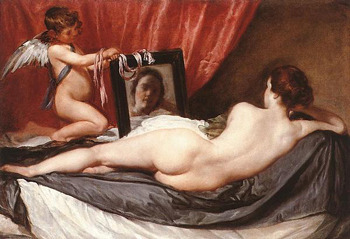
Here, her hair is even similar to Irene's, as are the color found in Irene's home; Red, Black, and White.
"The eyes, in turn, are the paths to truth: they are the “window to the soul”, or, ever-more interestingly, the “mirror of the soul.” Aphrodite, in gazing into the mirror, is therefore not merely enjoying the sight of her own beauty, but is acknowledging the truth of all that resides within her..." X
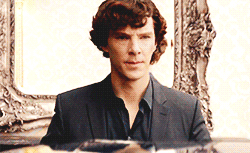
As our story's mirror to Irene, Sherlock appears to go looking for his own truth. If the popular LSIT theory holds true, that The Hiker & the Backfire are indeed about John's failed Romantic getaway with Sarah, it would seem that Sherlock is again, solving multiple mysteries, rolled into one.
The cherry for me in this tale, came from the excellent Art meta by @sagestreet cleopatras-leg-the-sexy-tapestries-in-asib,
"...we get a depiction of the Goddess Aphrodite (Venus) standing behind the couple, her hand outstretched above their heads in benediction. Yes, the Goddess of Love is literally blessing (!) the two lovers just as they’re turning their faces towards each other, about to kiss, absorbed in whatever this little sex game of theirs is.;)"

(OMG...these two. And it HAD to happen within close proximity to Venus.)
But to continue, we get this other bit from Sage's meta: "At the height of the feast, Plutarch tells us, Cleopatra made an entrance dressed as the Goddess Aphrodite, the Goddess of Love." So, in a fun bit of the writers' affinity for inverting, they had Aphrodite Irene, take and dress in Cleopatra Sherlock's clothes....

...here, as she brandishes a phallic symbol, her scepter whip, another Empress motif. She did this, not just once...
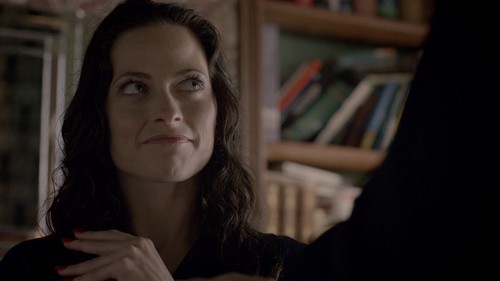
...but twice. Irene brought Truth into John and Sherlock's relationship, never swaying from her purpose, even as she played her game of War.
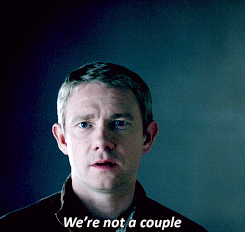
And why not? Venus is known in Ancient times as being the Patron Saint of Homosexual Love between men. Sappho's poetry holds her also as a Saint for Lesbians. X Aphrodite Ourania, the celestial Aphrodite, born from the sea foam after Cronus castrated Uranus...also inspired homosexual male desire or, more specifically, ephebic eros." X "In one context, she is a goddess of prostitutes; in another, she turns the hearts of men and women from sexual vice to virtue." X This could be the possible reason for her chosen profession in Sherlock. She inspires, tempers, and balances, seduces, but more importantly, communicates openly, with her own heart. She knows quite well, the secret wishes made by the hearts of Man. Well...she knows what they like.
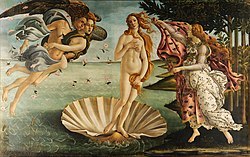
Venus Rising by Sandro Botticelli
Meta inspired, as usual, by a little talk with my friends X . Also, by Planet Narnia: The Seven Heavens in the Imagination of C.S. Lewis by Michael Ward, in which he theorizes that the children in Narnia were each given the personalities of the Seven Ancient Astrological bodies. This book is spotted behind John's chair, in A Study In Pink. The 7th chronical is titled The Final Battle.
@ebaeschnbliah @darlingtonsubstitution @gosherlocked @love-in-mind-palace @loveismyrevolution @kajaono @let-bijohns-be-bi-johns @rominatrix @theragesniff @rinkagaminesstuff @johnnytik @sagestreet @monikakrasnorada @delurkingdetective @221bloodnun @impossibleleaf @tjlcisthenewsexy @devoursjohnlock @roadswewalk @marta-bee @may-shepard @fleurdelisandbees @madzither
#Irene Adler#Aphrodite#Venus#Myth#Astrology#Mythological Intertext#Love#Passion#War#Sappho#Motifs#a scandal in belgravia#C.S. Lewis#Michael Ward#Narnia
58 notes
·
View notes
Photo
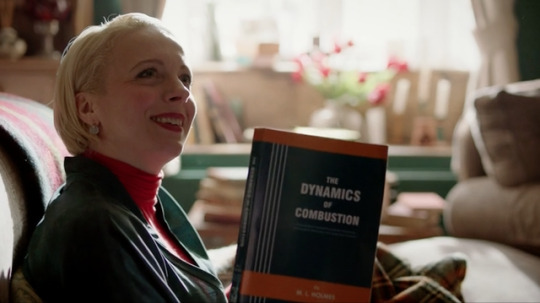

Redbeard/Yellowbeard, Vernet, & Time Travel: Various Ways HoB & T6T Are Connected
Gatiss: To be honest, I put [an explanation of Redbeard] into the first draft of episode two, and actually explained it – the reason that Sherlock was behaving like a child was because he’d once upon a time fallen for that story that your bunny rabbit has gone to live on a farm somewhere. And then we thought, ‘No, let’s hold it back because we can tease it a bit.’ And we genuinely thought, ‘We can keep this running for years.’ But then actually…
Moffat: It’s nice to have resolved it.
Gatiss: So the truth is that when he was little – and obviously Mycroft tormented him about it – is that his dog died, and he totally fell for the idea that Redbeard had gone to live in a happy valley somewhere. ( x )
Yes, we’re back to the rabbit idea…as in HoB and time travel…mentioned here. (Read that meta, because otherwise, the rest of this won’t make sense.)
Moriarty
Is he not the celebrated author of The Dynamics of an Asteroid, a book which ascends to such rarefied heights of pure mathematics that it is said that there was no man in the scientific press capable of criticizing it?
— Sherlock Holmes, The Valley of Fear
This topic had been covered by *Newcomb about 20 years before, and it may have been him that inspired the character of Moriarty.
Mary reading Dynamics of Combustion, and 221B is blown up in TFP, but she also manages to jump in front of a bullet in T6T before Sherlock even really has time to react.
The book that Moriarty wrote involves chaos theory.
Remember in the meta about the blog entries being recycled in S3 and S4? It’s related to that, due to the butterfly effect
Simple actions and events can alter history, especially if your memory isn’t reliable.
“The butterfly effect is exhibited by very simple systems. For example, the randomness of the outcomes of throwing dice depends on this characteristic to amplify small differences in initial conditions—the precise direction, thrust, and orientation of the throw—into significantly different dice paths and outcomes, which makes it virtually impossible to throw dice exactly the same way twice.“
Butterfly and Dice…oh!
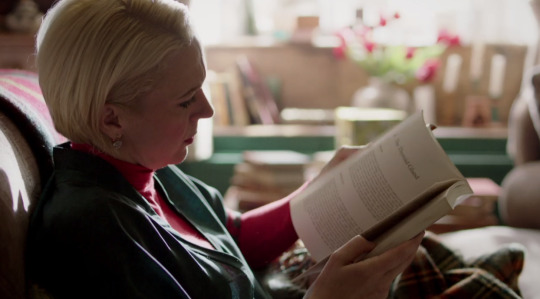
Well, here’s Mary reading the The Thyroid Gland, which is usually described as being butterfly-shaped. **Knowing about it is important too, if you’re involved in time travel.


They were in the video on John’s blog, that Moriarty did when he entered 221B back in 2012, and Mary had her own that showed side 4 when she was going across the map.
T6T
Mary: How? Every movement I made was entirely random, every new personality just on the roll of a dice!
Sherlock: Mary, no human action is ever truly random. An advanced grasp of the mathematics of probability, mapped onto a thorough apprehension of human psychology and the known disposition of any given individual,can reduce the number of variables considerably. I, myself, know of at least 58 techniques to refine a seemingly infinite array of randomly generated possibilities down to the smallest number of feasible variables.
Then, he admits he made part of that up…
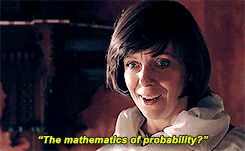

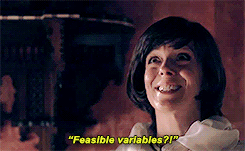
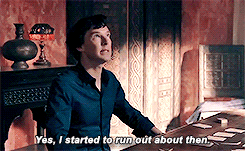
By TLD, Sherlock is using some method to figure out where people need to be two weeks in advance. But…if not the one above, then time travel?
Two Major Results of Time Travel
-You die faster “The time machine can’t adjust your age backward–if it did, it would be altering your brain at the same time, wiping out the memories of what you experienced.” Hmm, wiping memories…It would be very beneficial to have a storage place for all of those…somewhere beyond a Mind Palace, which could be altered.
-Eating would be a problem, partially due to **bacterial infections gained from unfamiliar foods and their processing.
Redbeard/Yellowbeard The Space Pirates
TSoT
Mycroft: So, this is it, then. The big day. I suppose I’ll be seeing a lot more of you from now on.
Sherlock: What do you mean?
Mycroft: Just like old times.
Sherlock: No, I don’t understand.
Mycroft: Well, it’s the end of an era, isn’t it? John and Mary – domestic bliss.
Sherlock: No, no, no – I prefer to think of it as the beginning of a new chapter.
*Mycroft is silently smiling on the other end of the phone line*
Sherlock: What?
Mycroft: Nothing!
Fast forward through the mentions of not getting involved…
Mycroft: Oh, by the way, Sherlock – do you remember Redbeard?
Sherlock: I’m not a child any more, Mycroft. *Sherlock’s jaw clenches*
Mycroft: No, of course you’re not. Enjoy not getting involved, Sherlock.
Mycroft telling Sherlock not to get involved, because history will repeat itself.
By HLV, we see Redbeard running toward Sherlock in the hallway, after Sherlock has been shot. It’s also the only time we see Mary with her wedding veil down over her face, as it would have been during the ceremony.
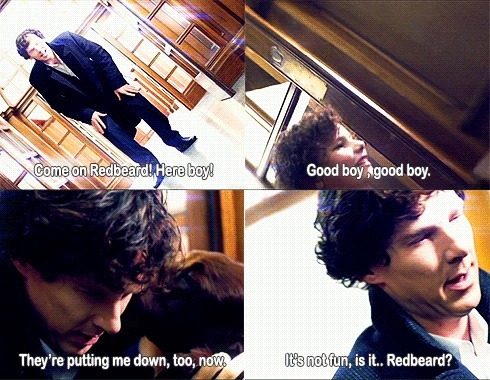
TAB
Redbeard = Nothing or 0
Watson: As your friend, as someone who…worries about you, what made you like this?
Holmes: Oh, Watson. Nothing made me. *we hear claws scratching, and a dog whimpering*
Holmes: I made me. *scrabbling and whimpering continues*
Holmes: Redbeard?


Now, we look at Mycroft’s notebook, and the binary matrix at the top with all the 0s. Combined with the equation underneath Scarlet Mo […??], it’s about working with space and time.
Not sure how? There are meta for that. ( x ) ( x )
In T6T, we have a visual for missing gaps in time, because of the clock that goes along with Sherlock’s fight with Ajay, but it’s not understandable as such until we’re in TFP. Meta by @darlingtonsubstitution
Alternately (or also), the sixteen by six, five by seven, nine by nineteen could be measurements. Due to the TLD & The Valley of Fear connections, however, I still prefer @darlingtonsubstitution ‘s explanation for the dimensions.
TFP
Redbeard is made into a code word for Victor Trevor, Sherlock’s childhood friend, who was taken from him by a female. Sherlock was Yellowbeard, and that’s who Mycroft dresses as in TFP.
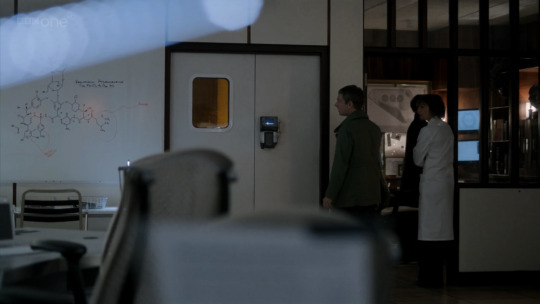
Back to Baskerville, and this formula on the whiteboard.
**Vancomycin Hydrochloride
Vancomycin is an antibiotic. When taken by mouth it fights bacteria in the intestines.
The bactericidal action of vancomycin results primarily from inhibition of cell-wall biosynthesis. In addition, vancomycin alters bacterial-cell-membrane permeability and RNA synthesis. There is no cross-resistance between vancomycin and other antibiotics. Vancomycin is not active in vitro against gram-negative bacilli, mycobacteria, or fungi.
Nice to have if you’re concerned about eating while in another place in time and space, along with that knowledge of the butterfly-shaped thyroid Mary read up on HLV.
611174 - Hamamy Syndrome or Gene ID for Canine Lupus Familiarus
Hamamy syndrome is a genetic disorder which is marked by abnormal facial features and defects in the heart, bone, blood, and reproductive cells.
Hamamy Syndrome is something a person is born with, so it cannot be caught or developed. Unless you have the ability to manipulate genes, as they do at Baskerville.
Or, you can write it down to recall your family dog that died when you were children. The dog that wasn’t a rabbit, because the rabbit was being genetically manipulated.
Vernet
One, it's a reference that was used particularly in the Granada series, where more than once Holmes or Watson mentions that Vernet was Holmes's relative--his French grandmother's brother. We're also back to the Dr. Who references. Madame Vernet is in the episode The Pandorica Opens, the episode that talks about the butterfly effect without actually using those words. It’s also in the same story arc with Amy’s Choice, which is basically the plot, villain, and even villain actor as in TLD. I’ve actually seen several meta on that connection, but the one above is the shortest, and makes the point.
As for pure mathematics, a topic close to Moriarty’s heart…
TD: Time Dimension Logical Sequence Number
The key component of any successful OBIEE implementation is the metadata model known as the repository (RPD).
Doing it right is sometimes considered “black magic”, and small mistakes in the RPD can impact all the exposed Subject Areas, resulting in poor performances or, even worse, wrong results. ( x )
So, it’s rather like the mathematic data-manipulation remedy against the butterfly effect?
T6T
Mycroft: Back on terra firma. *while he’s talking about manipulating data*
Teradata: One of the leading metadata storage, management, and analytics companies in the world.
TD12 = teradata 12 - version which would have been in use during HoB.
Or choose its leading competitor…
Oracle:
Sequence numbers are enumerations of time dimensional members at a certain level. The enumeration must be dense (no gaps) and must correspond to a real time order. For example, months in a year can be enumerated from 1 to 12.
Oracle the data company, not as in someone that has premonitions.
Mycroft: Are you having a premonition, brother mine?
Sherlock: The world is woven from billions of lives, every strand crossing every other. What we call premonition is just movement of the web.
If you could attenuate to every strand of quivering data, the future would be entirely calculable, as inevitable as mathematics.
Mycroft: Appointment in Samarra.
Sherlock: I’m sorry?
Mycroft: The merchant who can’t outrun Death. You always hated that story as a child.
Less keen on predestination back then.
Sherlock: I’m not sure I like it now.
Mycroft: You wrote your own version, as I remember. Appointment in Sumatra. The merchant goes to a different city and is perfectly fine.
Sherlock: Goodnight, Mycroft.
Mycroft: Then he becomes a pirate, for some reason.
Sherlock: Keep me informed.
Mycroft: Of what?
Sherlock: Absolutely no idea.
If you’re going backward though, you still need logical sequence numbers, to avoid a casual loop. Those happened in Dr. Who episode involving Bootstrap Paradox, written about here by Jonathan Holmes
…and the 80′s film, Somewhere in Time, where a playwright uses self-hypnosis to assist him in traveling back in time to the woman he loves. A pocket watch results in the loop. This brings us back to Sherlock first telling John how he knows about his history, because in canon ACD, it wasn’t a phone–it was Watson’s pocket watch. It’s twin, is in TAB, with the photo of Irene Adler.

Tagging @may-shepard because of the HoB/T6T connection, and @swimmingfeelsinajohnlockianpool @princess-of-fireflies @sherlockians-get-bored @darlingtonsubstitution
54 notes
·
View notes
Link
Chapters: 1/1
Fandom: Star Trek: The Next Generation, Professor Moriarty Series - Michael Kurland, Sherlock Holmes & Related Fandoms
Rating: General Audiences
Warnings: No Archive Warnings Apply
Relationships: Sherlock Holmes & James Moriarty
Characters: James Moriarty, Sherlock Holmes
Additional Tags: Meta, Holodecks/Holosuites, Holodeck Character, Artificial Intelligence
Series: Part 1 of The New Moriarty Adventures
Summary:
Moriarty found himself repressing a shudder. Paradox is a powerful word to a mathematician, and at present his own existence was more or less that of a living mathematical construct. More, he had seen the records of Starfleet’s prior encounters with self-aware computer intelligences – Vaal, Landru, Nomad, and the like.
I am wise enough, I hope, to resist simple logical trickery. But I must be secure in my own inner nature to move forward in the present game, and I fear the result of probing too deeply on my own. I require…assistance.
0 notes
Text
How To Get Your Crush To Like You | The Sherlock Paradox
How To Get Your Crush To Like You | The Sherlock Paradox
Find out how to get your crush to like you. This story about Bob represents real life situations that play out every single day, and by understanding what is going on with Bob, you’ll know what you need to do to get girls to like you.
However, although this applies to girls, it’s also incredibly important for life in general.
Our…
View On WordPress
#advice#animated#animation#attraction#crush#does she like me#facts about attraction#get a girl to like you#how to#how to attract women#how to get a girl to like you#how to get a girlfriend#how to make her chase you#how to make her like you#how to make her want you#human attraction facts#love attraction psychology#psychological facts#psychological tricks#signs of crush
0 notes